#Again‚ I think his desire for death becomes even more complex in this context
Text
I can't believe they made Blade ask with a broken voice why is it only abominations that come back over and over again. Blade, who can't die, who comes back to life again and again
#His desire for death gets a double sense in this context I think#I also really liked the parallel between him and Jingliu this draws#and of course the parallel between him and the abominations of Abundance#In this context‚ the fact that set of relics works so well on him gains layers too‚ enhancing the similarity and identification#I also liked the contrast Blade drew between the abominations of Abundance returning and Baiheng remaining ashes#Especially given the past of little Yingxing#And I love how all that works in the context of Blade's own immortality#Again‚ I think his desire for death becomes even more complex in this context#Goodness I love him so much#This was heartbreaking to watch. I didn't expect to care this much#Fragments and scraps#I talk too much#Blade#I feel like I could talk about this character for hours#I feel like I could break the world in two with a scream that were no sound and resembled more the vibration of a heart beating once#I feel like I am breaking in two#What I mean is that I hear a melody that can't be heard and the melody is this story beating in my blood#If I were to get a paper cut the story more than my blood would stain the paper#If I were to hold my finger to my tongue and lick the blood‚ it would be the story I'd drink
13 notes
·
View notes
Text
What if Quanxi became Denji's mentor?

A little thought I'd like to share with you.
I've mentioned it before, but Quanxi and Denji are weapons with a lot in common. So far, Quanxi is the only weapon who has also seen her entourage (her girlfriends) killed before her eyes. I think that even after the brainwashing she received from Makima, she remembers because she wears a lace band around her neck.
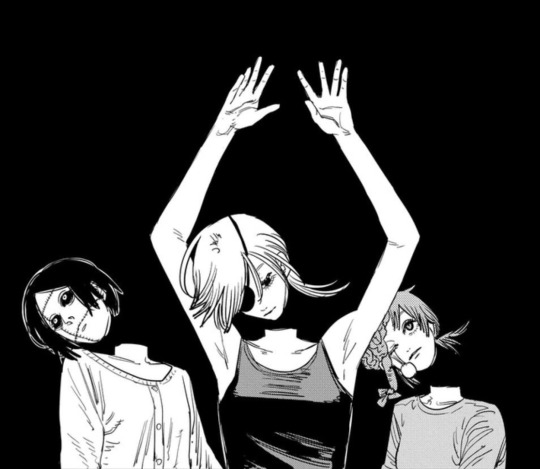
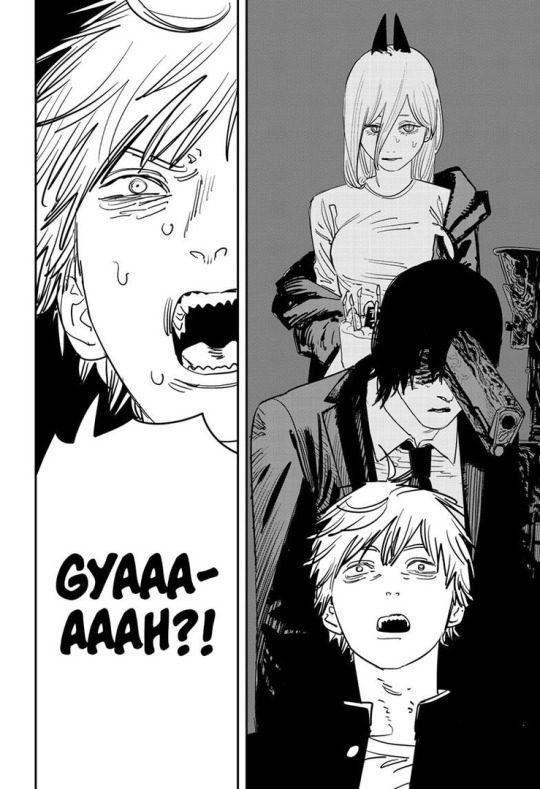

Once again, Quanxi marks her points of vulnerability in this way: her activation point is hidden by her eye patch, and the band not only expresses the fact that she's been decapitated, but also symbolizes the grief she feels at having seen her girlfriends after being executed.
The public hunters seem to want to annihilate Denji's identity as a weapon, and he is no longer allowed to claim his demonic identity, to claim to be a hybrid being, and is forced to act as a human.
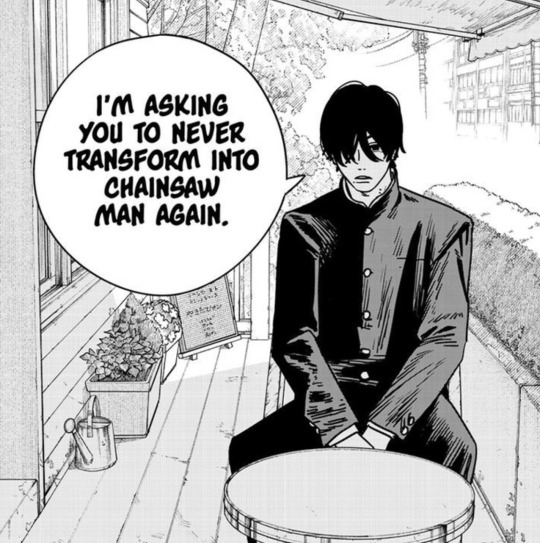
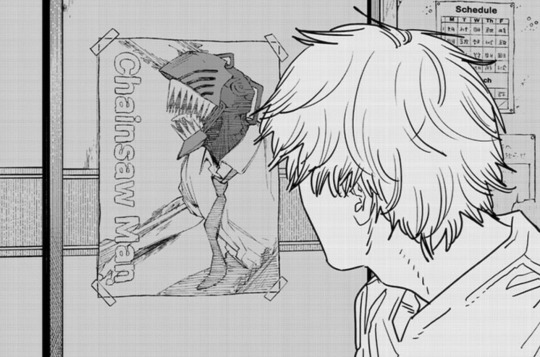
Quanxi fights most of the time only as a "human", she doesn't have the reflex to immediately activate her activation point to transform.
Maybe you can see where I'm going with this, but just as Kishibe was Denji's mentor (temporarily and in his own way), is there any world in which Quanxi wouldn't become Denji's?
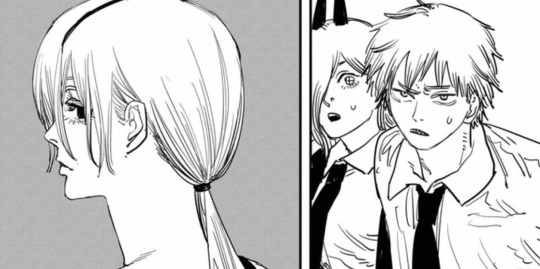
Yes, she has no interest in boys, but Denji has the same reflections and reflexes as she does? To give an extremely privileged status to women? Whether it's their loneliness, the dismantling of their loved ones, or their "values", Quanxi and Denji have a lot in common?
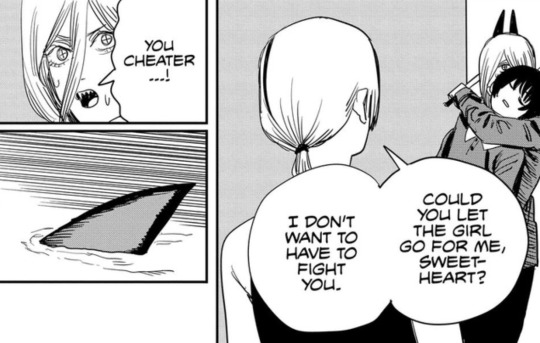
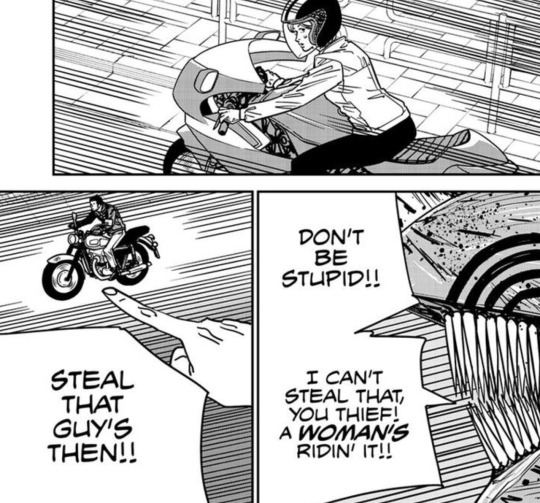
In an arc where Fujimoto has merely repeated Denji's question marks, he has created a complex context that prevents his protagonist from acting: could fighting as a human be his way out?
Because Denji wants us to start seeing "Denji" as well as "Chainsaw Man". Who didn't say that the human in this hybrid being couldn't be appreciated as a hero?

The fact that Quanxi marks her vulnerabilities is not meaningless; it's inevitable proof that, as a weapon, she embraces her human condition to a greater extent than the others, who insist on feeling like supermen.
And again, it's more complicated... because for the moment, each weapon has its own response... or rather, a type of response to the identity crisis that can result from not belonging to either camp.
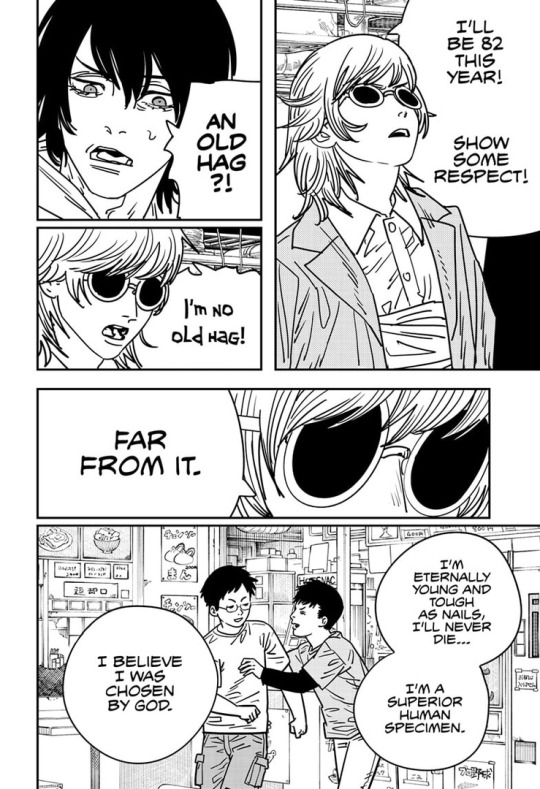

The whip demon considers herself a superman, while the spear devil has no answer.
Reze, the bomb devil, was the one who most embraced her weapon identity, being a veritable offensive object of Russian propaganda, but that didn't stop the girl from being disturbed by her dual identity, expressed by her desire to go to school but also by the fact that she also saw herself as Denji.
Barem for his part, has yet another answer of his own, as he completely avoids the identity crisis caused by the fact that he belongs to neither humans nor demons. For him, spreading death is a common denominator, blurring the boundaries between species.


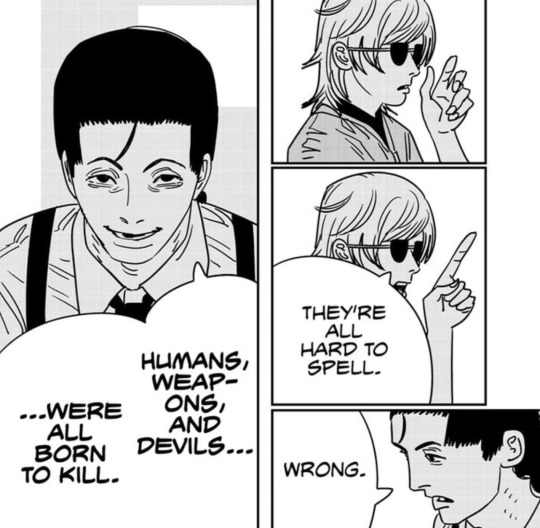
Then there are the weapons who added a "-Man" as a suffix
Sugo Miri had mentioned it as a joke, but in reality "-Man" is a different kind of response.
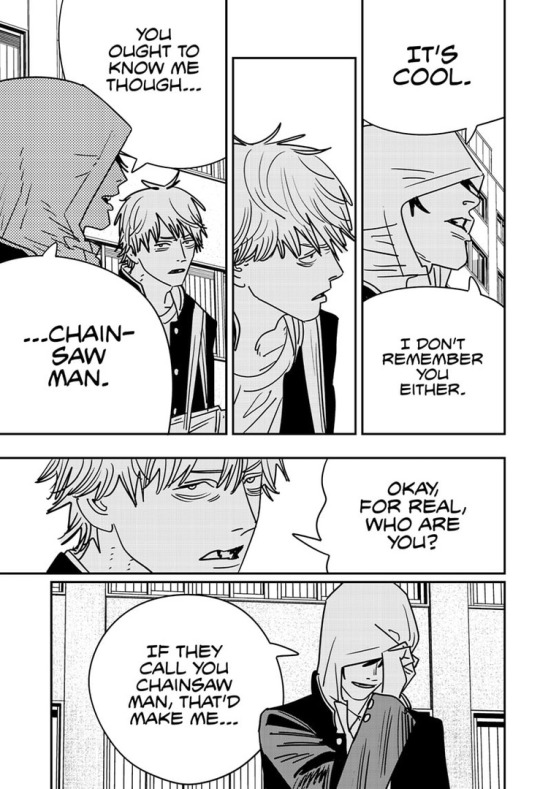
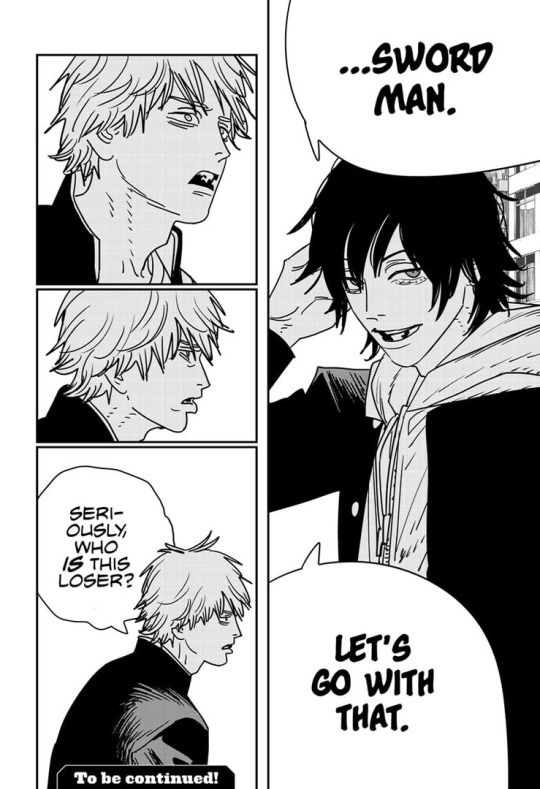
Miri locks himself into denial, convinced that his new instrumentalization by the church is by choice, as if this would transform his situation into one governed solely by free will.

In the same way, Katana Man, when confronting Denji, expresses his remorse at killing even one zombie, that he has retained his "human heart", which is also in itself a form of denial, since all weapons have a demon heart, so he doesn't fully embrace his nature.
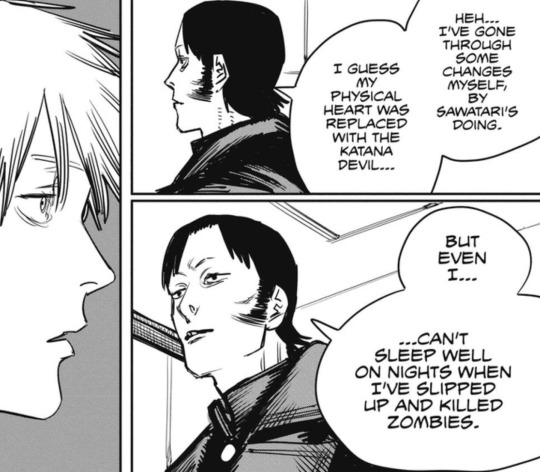
Denji is another type of response, even though he has the suffix "-Man", which doesn't express denial but rather gives importance to human condition, whether through freedom as a human characteristic with Miri, pseudo-morality with Katana Man or the need for integration with Denji.
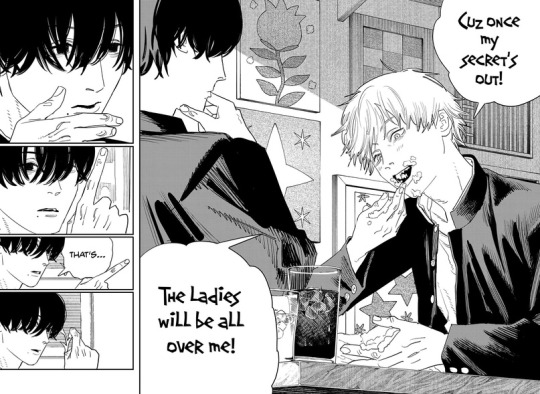
Quanxi is yet another type of response: she has learned to identify herself in a way other than through the prism of the human/demon dichotomy that creates an identity crisis in weapons, she has circumvented the problem by proving her worth other than by nature and her natural gifts by being an outstanding fighter without transformation.
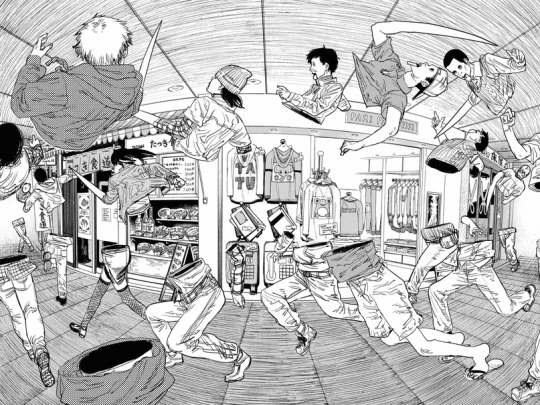
But she's attached herself to beings without barriers, to the point of having romantic and sexual relationships (from a sentimental and organic/bodily point of view) with demons, her girlfriends
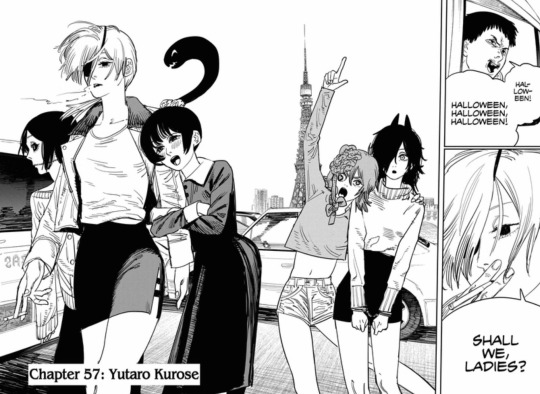

Denji is imprisoned by the public hunter's dilemma: either Chainsaw Man or Denji.
Quanxi is also in a vulnerable situation, and I think that even though she still has some memories, the institutions have taken advantage of her state of weakness and confusion following Makima's brainwashing. Makima had turned weapons into weapons for the Japanese government, and although the government has lost control of some weapons, it still retains the use of others. Whether it's Katana Man, who no longer works for the Yakuza, or Quanxi, who works for China, the weapons have all changed owners.
Quanxi is just as trapped in a system that doesn't make her happy and that I think she hates as Denji.
Quanxi, as a fellow weapon in the same situation, is the one who hold the answer.
While the other weapons boasted of their immortality, Quanxi provided the answer in the chapter 143 : her lace neckband symbolizes a single idea, death affects everyone, even immortal beings.

#chainsaw man#csm part 2#csm#csm spoilers#quanxi#denji#reze#katana man#weapons#kishibe#my thoughts#analysis
134 notes
·
View notes
Note
Hate to use this phrase but media literacy it’s truly dead. People saying Rhaenyra doesn’t care about losing Daemon when Emma delivered Rhaenyra’ sadness over this possibility in a heart wrenching way…
She spent 6 years married to him and had 3 children in those years, to say she didn’t have romantic feelings for him and wasn’t happy with him it’s just deny the obvious. And clearly one of those feelings in succumb into a vulnerable and intimate position with Misarya, the only person who’s saying to her exactly what she needed and wanted to hear, she’s feels she’s losing everyone and Mysaria brings her a feeling that she’s still believed and capable. Rhaenyra sharing that moment with Mysaria doesn’t exclude her conflicted feelings with Daemon, she can love him and resent him at the same time. Right before kissing Misarya, she literally tells her that she and Daemon are “two halves of a whole.”
Wow, I just got off talking about this...
Huh...I didn't watch the episode, but my hunches are shared? Noice.
I think that the disconnect is that Rhaenyra also says she never trusted him, not "truly". Without the Dragonstone-family scenes I have said should have been included and expanded in S1, we can only rely on the picture of happiness and teamwork we got in episodes 7 & 8. And no, even episode 10 has some serious faults with how Rhaenyra calls it "Daemon's war", as if she wasn't the one who enlists him and marries him with the words (paraphrasing) "I cannot stand against the greens alone", knowing exactly what sort of dude this was. Which included knowing he still would always support her, not his own nonexistent ambitions for the throne. There is a diff b/t one's ambitions to become king, and one's willingness to be largely obedient to one's orders or anticipate their desires well, as what I think the writers were trying to convey in that argument but failed utterly and made it more about Daemon wanting the throne for himself. None of this "those who don't want the power are the best leaders" crap...and no, Viserys did not have any points about Daemon's loyalties, the man cut open his own wife and he decided he should question Daemon's loyalties?! Ha! When have we started validating Viserys' stupidity?!
So, to some in the audience, it is jarring for Rhaenyra to doubt him or feel miserable by his actions even under the context of a war breaking out and her doubt of getting support from those outside of Dragonstone. Which still doesn't make sense bc Aemond should rather be feared and reviled for his kinslaying, but apparently Jaehaerys' death is the only death that matters and suddenly Westerosi lords care for "compassionate" payback over oaths of loyalty. It appeared as if Rhaenyra forgave Daemon for the brothel thing, and yes completely bc the show didn't give us anything to think otherwise--again, they might have if only the show had shown us life at Dragonstone before the war. The writers play a game of tug of war with the point of their scenes and pass them off as "complex" when they are just piss-poorly written as a chain of scenes linking a story/particular arcs together.
Anyway, yeah, that's the disconnect, most likely. To set up other things, the show contradicts itself even though the scene by itself is conveying a very clear plotline AND can be connected to another moment from another episode. I don't really blame people who think this way at all.
#asoiaf asks to me#rhaenyra and mysaria#hotd s2 epi6#rhaenyra targaryen#mysaria#daemyra#rhaenyra and daemon#daemon targaryen#hotd ships#asoiaf shipping#fandom critical#hotd fandom#hotd writing#rhaesaria#hotd#asoiaf
45 notes
·
View notes
Text
Shinobu Time - An Analysis
This arc is difficult to talk about because it’s hard to extricate it from the context of Second Season more broadly and Mayoi Jiangshi more specifically - so much so that it’s really more focused on Mayoi than the titular Shinobu. But I don’t think this works unless we take them both, together, as telling the story of these two girls (and maybe some other characters as well).
In Mayoi Jiangshi, Koyomi and Shinobu are catapulted to 10 years in the past. It’s a result of his desire to save Mayoi, but being a considerate person, he thinks about what he can do for his other friends. Can he rescue Hitagi’s family from a cult? Can he give Tsubasa more stable living conditions? No, he can’t. These issues are too big, too complex, for him to solve as just a random high-schooler, regardless of how early he gets in on it. Much the same for Suruga, Nadeko, and anyone else he knows. Except for one Hachikuji Mayoi, whose single unlucky accident seems eminently correctable.
It makes me think. What exactly is the difference between Mayoi and these other characters? I suppose it comes back to Meme’s old phrase - oddities arise for a reason. The circumstances that the other characters grew up in resulted in a condition where they almost had no choice but to call on oddities to help with their problems.
You could say that Mayoi’s parents divorce is the reason for what happened to her, but there’s no particular reason why she had to be hit by a car, why she had to be unable to see her mother on Mother’s Day. After all, that wasn’t the effect of an oddity. It was the origin story of one.
In a way, Mayoi’s situation feels fundamentally unfair. A character like Tsubasa, Nadeko, even Numachi Rouka - they become oddities because on some level, they want to be. That’s how they see themselves. It’s not good for them, but it does something, you can see why it happens. Hachikuji, though, isn’t a person that turned into an oddity. For all intents and purposes, she’s a supernatural entity from the start. Even as it causes her to suffer as a person does.

The difference between Mayoi and other characters - this is also the topic of a discussion between Koyomi and Ononoki Yotsugi. Koyomi has continued to live, even after being made undead, while Ononoki was reborn, becoming a new person out of the corpse of the old. Mayoi does neither, simply remaining in place. The point of such continued existence is what Ononoki wants to know. She questions the meaning of her own life. Surely life arises because of a strong desire. Surely, these undead oddities persist for a reason.
We might say that the reason for Ononoki is the desire of the people who raised her from the dead. We might say that for Koyomi, it’s his relationship with Shinobu. But thinking of it from this perspective, Hachikuji Mayoi’s reason for existing must be by far the simplest to answer.
After all, it’s a standard element for ghosts that they persist because of an unfulfilled regret.
Of course Mayoi didn’t want to become an oddity, didn’t want to become the Lost Cow, but she did want to meet her mother again. She did want to persist after death. In this sense, her fate is really quite excessively merciful. Fair to the point of indulgence. There’s no reason for her being hit by a truck, but there’s a reason for her becoming an oddity. And there really is a good chance that fate could be averted by simply bringing her to her mother’s house on a day 10 years ago.
The real question here is why she chooses to persist after she’s no longer lost. Ononoki wants to know if she’s happy with the current state of affairs. That’s something that Koyomi wants to know too, if there’s anything he can do for her, but he never asks. It’s the unspoken part of their relationship.

I want to say that Mayoi Jiangshi, as a whole, is about speaking aloud these unspoken truths, but it applies much more heavily to Shinobu than it does to Mayoi.

Shinobu would have destroyed the world had Koyomi not found her in Tsubasa Cat. This is left unspoken. Koyomi didn’t want to insensitively interrogate her motives during her silent period, knowing that he’d already imposed on her enough for a lifetime. Shinobu didn’t want to share, didn’t want to be seen as more petty and selfish than she already is.
The destroyed world is a shock to both of them, but nothing more than that. It’s not a challenge, or a mystery to solve. The problem, and its solution, are both inevitable consequences of the kind of person that Shinobu is. She confronts herself, and in doing so, much that she would leave unspoken is said aloud. That she only needed to open her heart to Koyomi a little more. That she doesn’t know how she could have. It’s needless to say, it goes without saying, it was left unspoken until now, but a Shinobu who couldn’t connect with Koyomi - might as well be dead.

The jiangshi, a form of zombie with a more solid feeling to them that calls to mind the concept of rigor mortis: being set in one’s state at the moment of death. The Shinobu of this world was dead for months, and yet unable to die. But Hachikuji Mayoi herself - not continuing to live, not being reborn, is she not a kind of jiangshi herself, persisting outside of her allotted time without any meaning or purpose?
This is a question Koyomi couldn’t bring himself to ask her, but he gets an answer by the end of the arc. He sees how much the Mayoi of the other timeline was changed thanks to his influence, and, returning to his own, he sees how his influence has also affected this Mayoi. How, because of him, she’s started enjoying being a ghost. Because of him, she wanted to stick around even after fulfilling her original goal.

A real apocalypse to Koyomi is the absence of other people, and that too is the true death of these undead oddities. Neither Mayoi nor Shinobu can live a worthwhile life, where they’re capable of changing and changing others in turn, without making a friend first.
However, in the pursuit of this goal, the two of them still have things left unaddressed - for Shinobu, in the past, and for Mayoi, in the future. Thus we move on to Shinobu Time.
The ‘time’ in the title is oddly reminiscent of the time travel plot Shinobu just got involved in, and the similarities don’t stop there. In both, her carelessness leads to widespread loss of life, the loss of her human connections. In both, she has to leap far into the air to avoid the consequences of her actions. Time is the thing Shinobu possesses most abundantly, stretching her life both far backwards and infinitely forwards, and the more we learn about her the more we learn this is not a boon at all.
We’re told that after enough time in one place, her nature as a vampire will draw negative energy to an area and cause masses of oddities to arrive, spelling destruction for the residents. I like to think of this as a smaller-scale reminder of the nature of vampirism - you cannot have mortal friends, they will inevitably perish with the passing of time. You, yourself have more time than you know what to do with, but it’s not a kind of time that can be shared. It can’t be used to build anything.

Which is why the incident where she was worshiped as a god is so tragic. Why did she continue giving the people of the area rain even after the first accidental miracle? Why did she do nothing to dispel their impression of her as a divine being, even by accident? Why didn’t she leave as soon as she realized they had no legends of vampirism, as she muses later? I mean, she tries to play it off as being careless, arrogant, indifferent, but there are enough hints that we’re not seeing everything here. If anything, the question is why she wouldn’t want to stay in a place where people like her, and she can help them instead of hurting?
Time is the curse of vampires, and the darkness slips naturally into that role when it demands an actor. After enough time, enough indifference, people start disappearing. Because there’s no way a vampire can get away with having a positive relationship with humanity.
It’s simply impossible. Shinobu was doomed from the start. Is what I want to say, because I like the tragedy of it, but in reality there is a very simple way out. Just become a god for real. Don’t tell me it’s impossible, this is Kiss-Shot Acerola-Orion Heart-Under-Blade in her prime, it would have been as simple as willing it. As wanting it. As admitting it to herself.
But she doesn’t, because the all-mighty vampire isn’t willing to admit that she needs something from other people that can’t be taken by force. She wants only that which can be given without her asking, and what isn’t given she watches go up in flames just out of her reach, not moving a finger. Is that not what caused the whole mess in Mayoi Jiangshi? It really puts into context, then, the opening scene of the Kizumonogatari movies, where she moves to drag Koyomi out of the sun. The desperation she must have felt, begging for help when she first meets him on the side of the road.
Time is the curse of vampires, because it at once broadens your perspective and narrows it. We don’t hear this story before this arc, Shinobu feels no need to tell it, because she forgot. The whole incident made her feel bad, so she shoved it to the back of her mind, let the endless waves of time wash over it until it was gone, and carried on as she had been. Or so she claims, anyway. I think the way she treats Koyomi after the fate of her first kin tells a different story.
Back to Mayoi, though. The tale told by Shinobu isn’t the only ‘time’ in this story, and the darkness slots neatly into the present day as well. Mayoi, also, is cursed by time. Eleven years of being lost and getting others lost is not time well spent. For Mayoi, too, as soon as her natural curse is dissipated, the darkness arrives to plug the gap. For Mayoi, too, there is a limit, an allotted amount of time that she can spend in the company of others.
As Izuko puts it, they’re both liars. Shinobu lied by omission, failing to inform the villagers of her vampiric nature, posing as a god without genuinely fulfilling the role of one. Her crime was indifference, or a deliberate facade of such. She made no attempt to communicate with others, and as a result they never got to know her. Unspoken truths, left on the table forever.
Mayoi, though - Koyomi denies quite flatly that she ever lied to him. He knows she doesn’t want to be a liar, doesn’t want to act rude to passers-by in order to put them off. So Izuko makes the accusation lying to herself. Making Mayoi herself the victim of the crime, because in doing her best to avoid causing trouble for others, she let herself suffer silently. She, too, has left truths unspoken, never clarifies the nature of her relationship with Koyomi, the nature of the gag routines they always do, the nature of her existence, what she really wants.
Time can solve the vast majority of people’s problems, Numachi Rouka says in Hanamonogatari, and throughout Second Season we see characters put this advice into action by running away. Kanbaru’s aimless sprinting, Shinobu’s mighty vertical leaps, Nadeko’s deflection and looking aside - they’re all examples of people trying to avoid confronting their troubles. Trying to get lost. I’ll get lost with you forever, Koyomi says to Mayoi, and he’s not just talking about an unspecified location. He’s talking about losing his entire life, failing to confront the things & people he really ought to.

Mayoi, on the contrary, doesn’t try to run away in the slightest. She doesn’t wait for the darkness to catch her, she goes out on her own terms and in her own time. In doing so she drops the shield of banter and irony she and Koyomi have used to make their relationship and feelings for each other ambiguous this whole time. He knows she’s been biting her tongue on purpose, but before now that was left as an unspoken truth. In a similar way, even Koyomi’s aggressive lecherousness towards her tells you something about their relationship. He does, in reality, experience desire for her, but exaggerates so much in the expression of it that it comes off as more of a gag than anything, which perversely becomes more comfortable for Mayoi. She can simply brush it off as a regular routine while continuing to scorn him as a lolicon.
An actual, genuine kiss is the exact opposite of his indiscriminate licking, and it comes along with an actual, genuine confession, albeit delivered in the past tense. Perhaps the only situation where she could have brought herself to say it.

After all, unlike Shinobu, there’s no way out. Mayoi is doomed from the start, by nature of being already dead. Unlike a vampire, ghosts don’t truly continue living after death, can’t actually change, especially not into a god of all things, that would be ridiculous-
Dear reader, I have watched this series before. As much as it’s in my nature to over-dramatize the tragedy of this arc, it seems more fitting to leave it on a hopeful note. Because Hachikuji Mayoi, in her final moments, did stop lying to herself. She stopped trying so hard to remain a ghost, a being that can’t change, and instead reached for something new - an unfulfilled regret different from the one that originally extended her existence.
I think in a fundamentally fair world it makes sense that would leave room for her to be saved.
22 notes
·
View notes
Photo

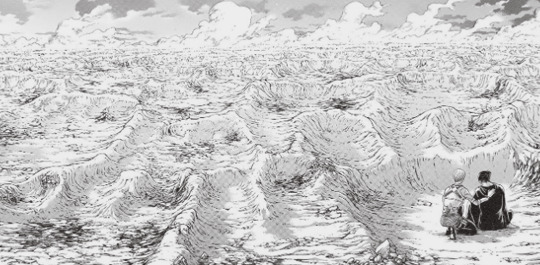
Eren Jaeger’s Final Words
So there are many people unimpressed with the final statement given by Eren’s character, either finding it inconsistent with the build up to this point, or too ambiguous a motivation for trampling all over the world. I’m not really here to talk about the quality of the story, whether it was good or bad, because I don’t really care. However, I think it’s fascinating what the text is trying to say about Eren’s character and his motivation.
This is why, “I don’t know, shrug” is both an answer and not an answer to why Eren did what he did in the end. For making my point in this analysis, I’ll be talking about Eren’s character from Marley on showing both the Eren that appeared before Reiner, the one that talked to Zeke, and finally the one Armin saw are all the same person.
1. And Now for Something Completely Different
Before I even begin though, let’s talk about something entirely different. My favorite episode of Doctor Who is from the 4th Doctor Era, entitled “Genesis of the Daleks” first broadcast around 1975. What makes this episode my favorite episode is both the premise, and the question it asks. If you haven’t watched Doctor Who the basic premise is the main character is a time traveler who can go everywhere and everywhen in the universe. One of his common enemies is the Daleks, a race whose goal is to kill everything else in the universe. The Time Lords order the Doctor to go back in time to the era the daleks were created, and prevent their creation in order to prevent every person they would eventually kill.
He goes do the Dalek homeworld, and meets the scientist who created them Davros. Eventually, the doctor fails enough that he’s not able to prevent their creation, but he could, wipe them out when they were just newly born children and completely innocent. The doctor decides not to kill them right then because that would be a pre-emptive genocide, and the Doctor is a pacifist. When Davros witnesses him making this choice it prompts this conversation one of my favorite in all of television. The link to the clip is here if you’re interested. [Source.]
Davros: "Now, future errors will be come victories. You have changed the future of the universe, Doctor."
Doctor: "I have betrayed the future. Davros, for the last time, consider what you're doing. Stop the development of the Daleks."
Davros: "Impossible. It is beyond my control. The workshops are already fully automated to produce the Dalek machines."
Doctor: "It's not the machines, it's the minds of the creatures inside them. Minds that you created. They are totally evil."
Davros: "Evil? No. No, I will not accept that. They are conditioned simply to survive. They can survive by becoming the dominant species. When all other life forms are suppressed, when the Daleks are the supreme rules of the universe, then you will have peace. Wars will end. They are the power not of evil, but of good."
Doctor:"Davros, if you had created a virus in your laboratory, something contagious and infectious that killed on contact, a virus that would destroy all other forms of life, would you allow its use?"
Davros: "It is an interesting conjecture."
Doctor: "Would you do it?"
Davros: "The only living thing, a microscopic organism reigning supreme... A fascinating idea.
Doctor: "But, would you do it?"
Davros: "Yes... yes..."
[ Davros raises a hand as if holding the metaphorical capsule.]
Davros: "To hold in my hand a capsule that contains such power, to know that life and death on such a scale was my choice. To know that the tiny pressure of my thumb, enough to break the glass, would end everything... Yes, I would do it! That power would set me above the gods!
Davros’ motivations seem at first brush look one-note and evil, just another mad scientist playing god. However, what makes the conversation great is the context it takes place in. Here is the choice offered to the doctor, kill a race that he knows will go on to make war and kill innocents in the future in their infancy before they have done anything wrong, or don’t kill them and ensure the future you know will happen.
The Doctor isn’t saying that his choice is the right one. He’s not saying he’s doing good by choosing not to slaughter an innocent race. He’s saying, he can’t bring himself to make that choice. In that situation he chooses not to choose, because it would be against his pacifist believes to choose either way. Which Davros at first, takes to mean the Doctor siding with him. However, when they begin to debate it, notice how they’re not talking about what is the philosophically correct choice to do. The doctor hammers in this point, would you do it? Would you do it? After getting Davros to admit that yes, he would do it, his motivation becomes much clearer, he doesn’t actually care whether his actions result in a good thing or a bad thing, he simply wanted to be the one who got to choose.
What does Davros want? The power that surpasses a normal human being’s ability to choose. Davros himself is basically written to be pure evil, but his desire itself is a little more complex. Davros is a person lacking in agency, if you tear him away from his support system he’ll die within thirty seconds. He designs what he believes is the perfect race capable of conqueringthe universe which are reflections of him. They’re soft little squid creatures in mechanical shells which are inpenetrable. Davros himself cannot seize that power, he is inferior because he’s attached to the life support system (in his own mind), so the power he wants instead is the power to make the choice to unleash them upon the world.
If the Doctor by failing to make that impossible choice in the situation, by not wanting to even hold the capsule in his hands and have that ability to choose remains a man, then Davros chooses to throw away his humanity (which he ties to his inferiority and weakness) and becomes a god instead. To tie my long tangent which just shows how much of a geek I am back to Eren, Eren’s choice wasn’t actually about bringing a good result or a bad one at all. He simply wanted to choose. People who are lacking for agency, who feel powerless and inferior to tend to grasp for it. They try to fix external circumstances instead of internally facing what is within them, because they can’t bear to face it (hence the complex about being inferior in the first place).
People often compare Kaneki from Tokyo Ghoul to Eren because their stated motivation bears some resemblance “we were doing this all to protect our friends”, however, it’s important to grasp that Kaneki and Eren are liars and unreliable narrators both. Their stated motivation isn’t necessarily true. I don’t think the final chapter is as clear as it could have been in nailing down the finer points of this, but Eren does in fact change his stated motivation from “I was doing it all to set up you as heroes of the world” to “I would have done it anyway even if you didn’t come to stop me” to “I don’t know. I just wanted to.” So, the fact that Eren will directly lie about his motivation and try to rationalize his actions and even switch stories in the space of one conversation is at least established.
So to bring the comparison back to Kaneki, both Eren and Kaneki lie about their external motivations that they are doing this for their friends when really they act because of unacknowledged internal motivators. They are secretly selfish, while presenting their actions as some kind of great sacrifice they’re making for the sake of others. The deepest we ever dig into Kaneki’s head he makes this statement.
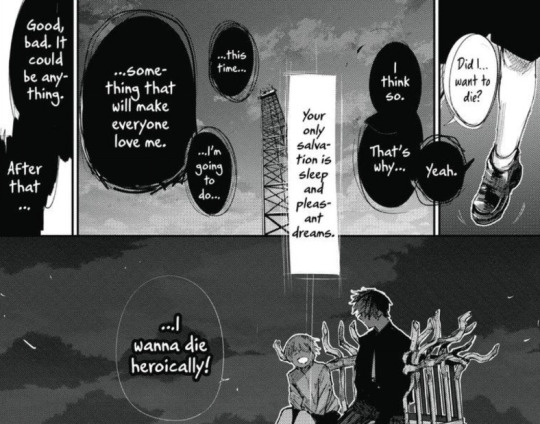
I’m going to do something that will make everyone love me. Good, bad, it could be anything. After that, I wanna die heroically!
Eren and Kaneki aren’t the same because they’re brave people who fight for their friends, it’s because internally they’re pathetic and unlovable. They’re so starved for agency and attention that they’ll do anything for it, and they just don’t care about the consequences for their actions. Kaneki also, later on in the manga engages in mass slaughter for once again what is a pretty bad reason. It’s not to protect someone or for the sake of someone else. It’s because he’s lonely and wants comfort.
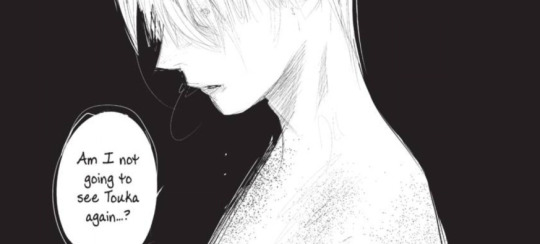
Kaneki doesn’t care about what he’s doing or the consequences of his actions, he’s desperate and wants to do what will immediately gratify him in the moment. He doesn’t even realize what he’s doing will unleash mass slaughter and have greater consequences because he’s not thinking about that.
Compare this to the doctor’s choice. The doctor knows the direct result of his actions, if he does not abort the daleks he will fail to prevent the deaths of innocent people. Knowing those consequences he says he still won’t make the choice because he believes his pacifist principles are something he won’t bend on. Kaneki, and Eren both have on principles, or no reasons. They just do whatever in the moment, and make up a reason after the fact. For Touka, For his friends, because he wanted to, because of freedom, because why not?
Kaneki and Eren can construct no good reason for their actions, and no principles behind their actions, because unlike the doctor, they don’t have a developed enough and they’re not capable of making measured choices. They steal away agency because they’ve been deprived of it, they want the feeling of power and control that comes with making the choice, but they don’t want the responsibility for it. The doctor knows if he doesn’t choose to wipe out the Daleks he’s responsible for that choice, but can’t bring himself to kill. His actions are pacifistic. However, Eren and Kaneki choose to kill in the same situation, and their actions inevitably cause the conflict to accelerate. The Doctor remains a man, Kaneki and Eren do not.
What kind of person would want to become a god anyway?
A person pathetically, incapable of feeling alright as a human being.
That’s why Kaneki and Eren make the choice to become monsters, because they’re incapable of living with themselves, or their actions as people. Either way they can’t live with it, hence why, Kaneki’s stated motivation is I’ll make everyone love me and then I’ll just die. Hence why the person who is making this statment is a childish version of him.
There is no good reason for what Eren does. That sounds like a cop-out answer after making you read all this long, but what is a good reason for killing people? This is a lot of rambling but I hope I’ve at least established that Eren’s internal reasonings make no sense, his internal mechanisms at least do. The reason he doesn’t come up with a reason is because he didn’t actually care about the result of his actions, he just wanted to be in the position to choose. He wanted absolute agency because he was denied agency like a child, and as a forever stunted child, he never grew up to realize that most people in the whole world eventually make compromises and live on with sadness instead of getting to do whatever they want.


Words that Eren was told again and again but failed to listen to. He’s not the only person that suffers in the world. He’s not the only person that’s lost people. He’s not the all-suffering protagonist of reality, he’s just one personin the greater scheme of things. However, the ability to compromise like that. To realize that other people exist besides you, that they have feelings separate from yours, that you are not the protagonist of reality is what an adult does, and what Eren can’t do. It’s easier to become god apparently, throw his whole life away as a child soldier making the ultimate sacrifice then just try growing up.
What’s the point of writing a character with such a pathetic motivvation? It’s because it’s human.
To badly misquote Jung, most people assume they are nice people when really they are in fact jerks. The reasons can be very complex, but sometimes it’s just as simple as not being able to look past your own ego and understand people feel differently than you do. Eren cannot accept other people, whether they be his friends, the comrades he’s fought with this entire time, the adults trying to guide him, he is just so incapable of accepting them that he regresses into a child making selfish demands of the world. It seems inhuman but imagine Eren in a completely different setting. What if Eren were just a shut-in? Just a teenager who didn’t leave his room. A fundamental ability to accept other people would sabotage all his other attempts to grow up and leave his room, and he’d choose to remain a child forever. The stakes are different, the situation is different, but the internal mechanisms are unmistakably human.
2. All Erens is the Same
Okay, here’s where I actually try to prove that Eren’s character arc is consistent with the story. What was revealed in 139 at all wasn’t a 180, and wasn’t a reveal that secretly Eren had good intentions all along. He never had good motivations, or selfless one. From beginning to end he was a selfish child, and his reasoning was always that of a stunted individual unable to understand the feelings of others but placing his own feelings as far more important.
What Eren does in 139 is rationalizing and changing his answer, which he has done several times before that point anyway, and is therefore consistent with his behavior up until that point. It’s important to acknowledge that Eren models himself, not after Grisha, but rather Eren Kruger. The foil to Grisha and the reaction to Grisha’s bad parenting is Zeke. The person who Eren makes similiar choices to is Kruger says the reason he picked Grisha is the eyes he possessed in childhood.


The thing about Kruger is, textually, Kruger fucking sucks. He says it himself. He claims he was doing it for the sake of helping others, and yet, all he ever felt like he was doing, was torturing people, and throwing them to the dogs. He kept saying he had good motivations, but his actions were repeated brutal violence, over and over again. He contributed more to the conflict than he helped to resolve it.

At the end of his life, Kruger says once again he doesn’t believe what he’s done has changed anything, and doesn’t believe he himself hs changed. He’s still the child with hatred in his eyes. His reason for passing it onto Grisha is because he knew Grisha wouldn’t grow up either, and would keep that inside of him. Kruger failed to grow, Grisha failed to grow, in a way that mattered, in time to make an actual change. They only ever made things worse, and that is, the model we are supposed to parallel Eren to.

Now this is at the same time that the Attack Titan’s future vision powers are shown to us. The question a lot of people are asking is if Eren had free will in his choice, or he was fated to make that choce all along. The answer is. No. Nope. Nope. Nope. Not at all. The fact that Eren was destined to do it, is yet another excuse, the like seventh change of motivation that Eren gives us. “I saw it happen in the future so I did everything I could to make it happen, but I didn’t think I had a choice this was the only way to make you guys hero,” Eren says, and then five seconds later. “I didn’t know what would happen , I probably would have done it anyway even if I knew you guys were all going to die and fail to stop me.”
Eren is once again making excuses, and avoiding all kinds of responsibility. If he is the chosen one, if his actions are controlled by fate, if he’s a god, if he’s a devil, he is not human and therefore he is not responsible. Eren wants the power to decide the fate for the world, but will do anything but accept responsibility for that choice. Eren wants to be Eren the bloody conqueror, but he’s not even self-aware enough to see himself as a bad person he can’t even own that so when confronted on his actions he reduces himself back to a child, and evades responsibility. Eren’s own motivation, his stated motivation is for no reason, however, the reasons he avoids the guilt like this are complex in their mechanisms as I wrote about above. The simple question is if Eren saw this future why did he not try to stop it? The simple answer is because he did not want to.
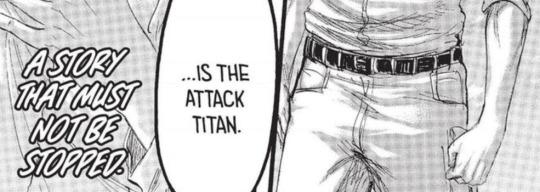
There are a million and one excuses Eren has for why he thought the future could be avoided, but his actions tell a different story. He didn’t lift a finger to try. He spent the next four years making rationalizations for what he eventually would do. I will now establish, Eren was actually given several oppurtunities to stop, and then he just did not stop.
In the Reiner and Eren scene while Tybur is speaking in the background, Eren is offered a choice. Quite literally, Tybur is narrating the same story that Eren wants to set up. Become the devil that tried to destroy the world, so the heroes (his friends) will defeat him. He’s given the chance to be genuine and talk things out with Reiner and what does he choose.
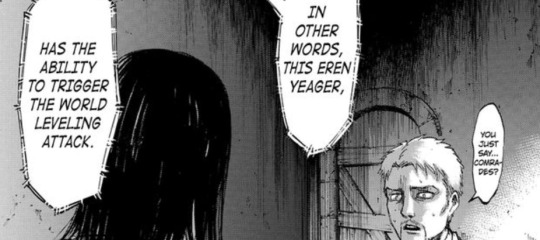
He chooses to accelerate. He could have stopped. Remember how Reiner was practically begging him to talk things out? Not only that but Eren sees that Reiner’s stated motivations for doing what he did were, completely fake, just rationalizations made up in the moment.
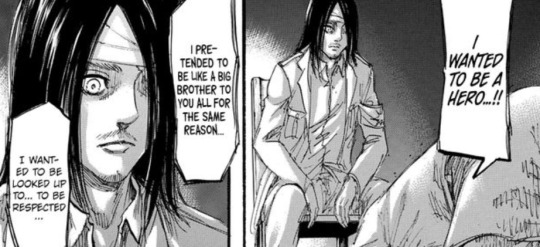
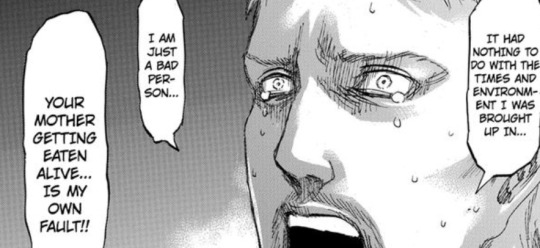
Eren is presented with the reality of who he really is, a child who hates himself, who wants to kill himself rather than take responsibility for his actions, and he chooses the narrative Tybur offers him. Rather than be hismelf, stop the story here, he chooses to move the story forward.And the conflict accelerates when they could have reconciled. Not because there was no other choice, Reiner was begging, crying, and holding Eren’s hand at the same time asking for peace and forgiveness but because Eren chose to accelerate the conflict.

Eren’s choices are always that of an accelerationist. When given the oppurtunity to stop, he chooses instead, to always make the conflict worse. That is, the result of Eren’s myriad of choices made throughout the arc. Everything is worse now, and more people are dead. Nothing good is achieved through these means because Eren wasn’t trying for good. Eren didn’t care about good results, he just wanted to be doing something. Easier to be an all powerful demon, than a powerless child which is what he sees Reiner as in the moment.
The only time I believe that Eren was putting on an act was when speaking with Mikasa and Armin. The rest of it wasn’t acts, it was just who Eren is, who he sees himself to be. The thing is most people don’t read Eren’s kind of behavior, constant masculine posturing, war mongering, accelerating the conflict, throwing himself into fighting, as childish and toxic when it is. The point of Eren’s masculinity is it’s a performance. Reiner crying and begging in front of Eren is embarrassing and pathetic yes, but it’s also how he felt in that moment, it’s a human vulnerability. Whereas, Eren’s outer persona is entirely empty of love and vulernability, of every emotion besides anger, and violence. However, because it’s empty, he just acts, empty... Great wording there I know. Eren when posturing in front of others basically has no personality. He is just guy who fights.
Eren performs the role of a ruthless soldier in front of others, because it prevents him from being vulnerable. Remember who Eren is posturing in front of, Reiner, and then later Zeke. What were they doing? They were both at the moment trying to appeal to his human side, Reiner by crying and begging for forgiveness a show of vulnerability, and Zeke by tryig to show Eren what their father did to them was wrong.
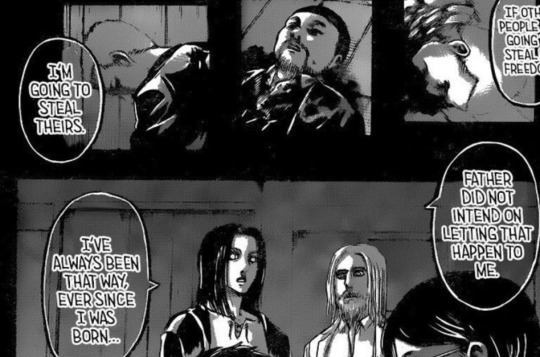
Calls for violence, posturing, warmongering and rhetoric, Eren’s every response when Zeke tries to examine his humanity. Eren insists over and over again, you see I’m not actually a human being. It was impossible for father to reach me because I was simply born that way. However, the kind of person Eren pretends to be is empty, someone incapable of feeling anything. The only way he knows how to be strong, is to simply not have feelings, to deny all human emotion and become something else and that’s just lame. We also know, that Eren himself is not like that because he contradicts his stated motivation that the only reason he killed those slavers was for the concept of freedom itself when he takes too long trying to look at Mikasa.

Eren denies himself empathy, he denies himself udnerstanding, and therefore no one will ever see his emotional wounds. That way, he can be invulenerable forever, but at the same time he denies MIkasa and Armin.

We return again to the motif of the story. It’s the same repeated image, someone tells Eren to stop, Eren says that it must not stop, the story must continue.
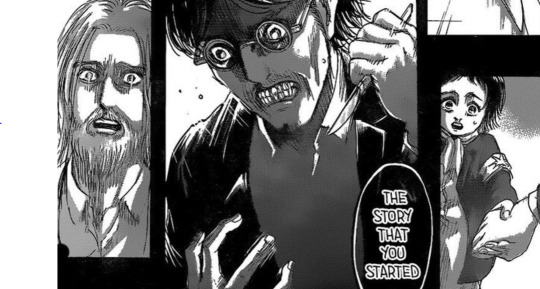
Both of Eren’s foils and family members,Zeke and Grisha tell Eren to stop this. That they do not want this. The whole world yells at Eren to stop, and he does not stop. Stopping would mean, accepting some measure of helplessness so Eren does not stop.
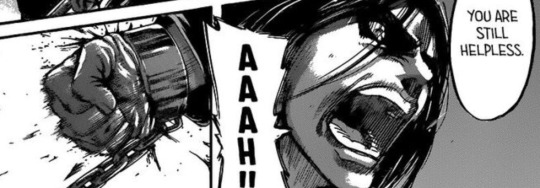
To be honest, what Eren says in 131 is far more telling than literally any of the excuses he came up with in 139 which is why I think it should be interpreted not as the final word on Eren’s character but rather, showing what his waffling actually looks like to an outside observer - not heroic at all but rather pathetic.
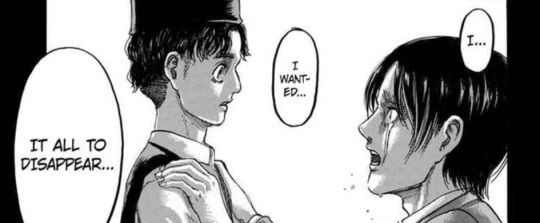
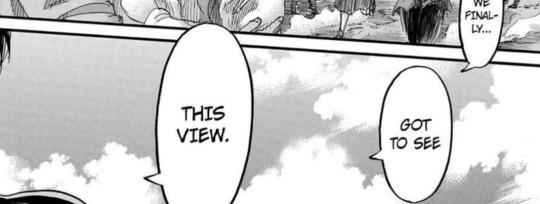
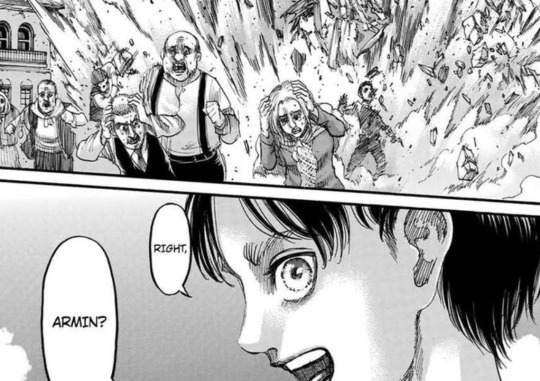
Eren’s childish desire to be this powerful, to stand up above everyone like a god while ignoring the suffering of the world around him - is pretty telling enough of Eren’s true motivations that he needs no further elaboration. Eren does not become god for the sake of his friends, he does not do it because he thinks it will make the world a better place, he does it because of childish delusions of grandeur and his inability to let go of his childish feelings of entitlement. The world isn’t the way he wants it to be and he can’t comrpomise with that in any way. Eren is more like a caricature of the most petty person on earth when you put it that way, but this is... a fictional story. Thematically Eren is a good example why ideals are ideals, and people are in fact, people, ulitmately very disappointing and falling short of those idealse. So once again moving past this.

Eren, you can literally just stop. Eren is basically given every choice in the world to stop, everyone else in the story tells him to, and he just doesn’t. The author does go to a painstaking extent to show that Eren in fact could have stopped. Every single time he is given the oppurtunity to stop he instead chooses to accelerate the conflict.
It is interesting to show the one time Eren actually did stop though. It wasn’t for Mikasa, it was Mikasa’s decision.
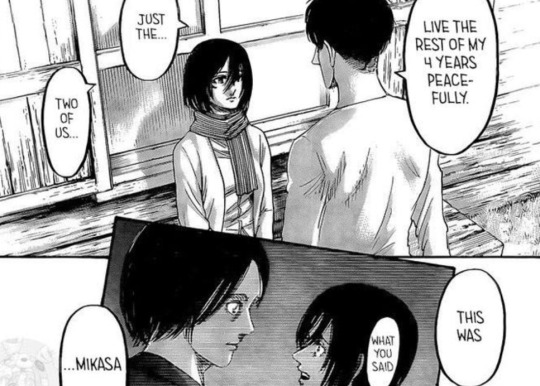
When Eren puts the decision on someone else, he can stop. Eren has feelings for Mikasa, but rather than confessing to her he makes her speak up about what her feelings are, even when everyone around him just, straight up tells him.
Why is he capable of stopping when it’s someone else’s choice?
In those cases, Eren succesfully avoids responsibility. When he makes the decision to run away in the possible alternate reality he’s doing what Mikasa wanted.
The other time is when he decides to accept the result of whatever Mikasa decides. In both cases, Eren rather than accept responsibility for his actions and the results of his actions, just, puts it all on Mikasa.

Is he doing this for Mikasa’s sake? To set Mikasa up as the hero of the world? No, he can’t even face Mikasa and explain himself or his feelings. Eren makes the choices to... put the ultimate decision on Mikasa, and run away without explaining himself because, that’s easier than taking repsonsibility for his choices. Every choice Eren makes, is to either make the conflict worse, because stirring the pot makes him feel powerful and in control, or throw control away to someonee else or some other reason (predestination whatnot) because he can’t bear the responsibility of what he’s doing. He wants to kill a bunch of people, but like... he doesn’t want to feel like a bad person about it (hence the excuse, he was doing it for his friends and yet later in the same conversation him saying that if he had killed his friends and they failed he still would have done it anyway).
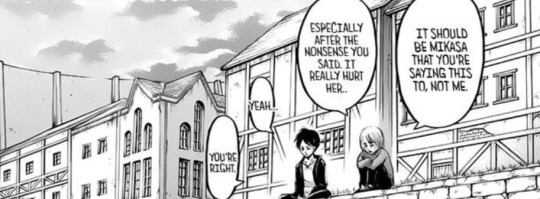
Therein lies the rub. Eren is not doing this for his friends, because he takes the one path that is guaranteed to take him out of their lives. He doesn’t do it for Mikasa because he does the one thing guaranteed to destroy her.
I love this girl so much, that I created this elaborate scenario where the only way she could save the world was to horribly behead me, the one family member left from her childhood after she spent her entire life trying to protect me from fear of losing her family - yeah that sounds completely insane.
It is meant to be. Eren is thinking jack all about what his friends are feeling. His feelings for Mikasa, his desire to keep her safe and away from everything else trump everything even the idea that his love might be returned. He loves at Mikasa. He’s not in love with her, he’s projecting his love upon her. “Why didn’t he just tell her about his feelings if he secretly loved her all this time?” the point was, he couldn’t. Eren’s ego isn’t developed enough to love another person, that requires actually caring about their feelings which Eren doesn’t do to well.
There’s a reason Eren and Mikasa’s connection keeps lingering back to the small kindness they showed each other as childhood,it’s because literally despite spending their entire lives growing up together, their connection hasn’t grown at all since then, because they can’t grown.
At the end of the series however, Mikasa makes the opposite coice of Eren. If Eren’s choice has been to remain a selfish child all this time, to make other people suffer rather than face his own hurt feelings. Mikasa makes the choice of selflessness, to grow up, beyond the child who loved Eren into the adult who knows that even if you love people, one day you might lose them.
Eren’s choices only ever make the conflict worse. Mikasa’s choice finally stopped the conflict that Eren kept accelerating. It didn’t save the world, it saved the world from Eren.
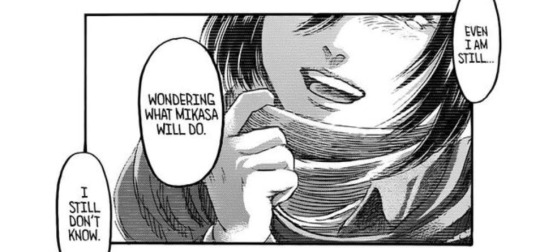
I think it’s important to remember that Eren didn’t see what MIkasa was going to do, that her actions were going to end up breaking the curse. He literally had no idea what was going to happena fter the massacre, all he saw was the massacre and decided to do what he could to bring it about.
“I did all of this for you guy.”

Backtracking, five seconds later, and making excuses it all would have happened anyway.
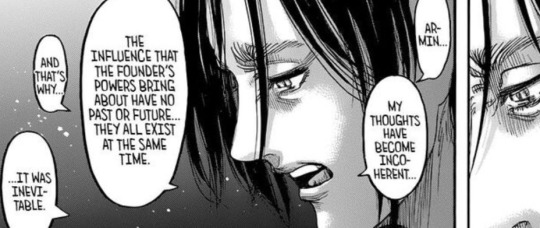
It’s the same behavior consistently shown throughout. Eren could have stopped. Eren did not stop. Afterwards, Eren wants to reconcile the guilt and believe that his motives were good, when his actions were the actions of a bad person. It’s the same as Reiner’s crying and begging after years of guilt and failure to reconcile his acitons with who he is. Eren can’t understand why he did what he did, he just knows he did it, and he can’t accept responsibility for any of it. So that’s why Eren throws the choice away.
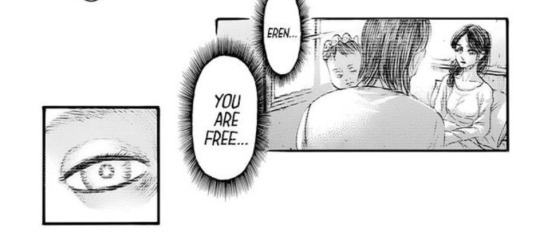
Eren can’t understand his father’s words, because in the end, being born, living his life, growing up, falling in love, making friends, losing some of those friends, growing older, getting weaker, all of those things are things Eren doesn’t want to do. Eren begins his life with “You were born into this world, you’re free to live hwoever you want” and ends his life wishing he was never born, and that’s the utlimate tragedy of his character arc. Not that it was inevitable he would eventually do these things, but beause it wasn’t and Eren chose to do them anyway instead of choosing literally anything else. Therefore, despite claiming Mikasa and Armin as the reason behind all of his actions, they weren’t, because he was inacapable of making the simple choice to be with them and grow up with them which is all they ever wanted from him.
#eren yaeger#eren jaeger#reiner braun#grisha jaeger#zeke jaeger#attack on titan#aot meta#attack on titan meta#aot 139#aot 139 spoilers#attack on titan spoilers#aot spoilers#snk meta#snk theory
781 notes
·
View notes
Text
ON FEYSAND’S PLOTLINE IN ACOSF
!!!!MAJOR SPOILERS FOR THE WHOLE ACOSF!!!!
.
.
.
.
Let’s be honest for a while, okay?
ACOCF had potential to be SJM’s best book, if not for any other reason then because of the sheer idea of it. Coming-of-age, healing story of the most complex and polarizing character she has ever created set in the time of peace, away from the familiar setting (according to the later changed concept which still remains in the snippet at the end of ACOFAS), development of her arguably most feisty and angsty love story... It could be her absolute trumph. Even with the change to stick to Velaris instead of exploring the Illyrian culture of the Mountains and with the added conflict of the Mortal Queens and Koshei, it still could work quite well.
It didn’t. For many, many reasons, but the most important one, in my opinion, being the feysand pregnancy plot.
Nothing about this plotline made sense. Not a single thing. From start to finish, it was an absolute disaster from the character-writing POV, from the narration POV, from every single context of it. It broke the rules of real-life logic, it broke the rules of this fantasy world setting and it completely exposed that Rhysand, while not a bad guy, is a pretty terrible partner, even worse ruler and an absolutely terrible contender for the High King title.
Let’s break this whole mess down (and expect this post to be mammoth-sized. it’s not my fault, though, write to SJM if you have any complains):
1) Feyre, 21, decides to get pregnant, even though less than a year earlier, she expresses the delight with not being forced to bear children to her new mate and told him herself she wants to wait a while and enjoy her life with him. Feyre decides she wants a baby though and Rhysand goes along with it, even though he is aware how young Feyre is and how hard her life has been up until this point. He wants a baby too much to have an honest discussion with Feyre about it, to stop and wonder what is the reason for her sudden change of heart, to reassure her that they have a lot of time ahead of them and don’t need to rush. No. She mades a sudden decision to have a baby after A YEAR OF MARRIAGE and not much more of being turned fae, JUST AFTER having her whole world put upside down, having received a completely new title and responsibilities, surviving the wat and being mated. Great.
2) Feyre decides to get pregnant and Rhys goes along with it less than a year after the end of the bloody war. It is politically a delicate time, everyone is still not sure how the balance will shift, some countries don;t want to sign the peace treaty, etc. There are a lot of enemies and a lot of turmoil remaining. But sure. Let’s have a baby. Perfect time to add yet another target, another weakness that can be use by the Mortal Queens, Beron or whatever else with malicious intent towards the Night Court.
2) Feyre gets pregnant after approximately a year of trying. I know healthy people of reproductive age for whom it takes ages more than this. Fae’s pregnancies are rare af and precious and happen once in a blue moon, but ofc SJM broke the world’s rules for her darling Feyre. And again, for Kallas and Vivianne who are also expecting the baby, even though it has been a maximum of 3 years since they’ve mated. 3 years is also not a particularly long time to try to have a baby for those who have issues with their reproductive systems like Fae women. Thank you, next.
3) Rhys has unprotected sex with Feyre in her Illyrian form when she conceives, even though he knows full well having a winged baby would kill her. He does it anyway, for shits and giggles apparently. They probably have sex in the sky above Velaris, for all we know.
4) The baby has wings. Now, the whole explanation with Illyrian wings being bony (bc they resemble bat wings) and Seraphin ones being more flexible (bc they resemble bird ones) is so insanely stupid that it takes around 3 seconds to wikipedia this shit and find out it’s exactly the opposite. But okay, the baby has wings and Feyre will die while giving birth, along with the baby. Madja forbids Feyre from turning into an Illyrian to carry the pregnancy because it MIGHT hurt the baby. Now, remember, Feyre conceived while in Illyrian form and then turned into High Fae. The baby survived it just fine. The baby MIGHT be hurt by Feyre turning .... but it will FOR SURE die if she stays High Fae and Feyre will too. Idk about you, but I would take the risk of MIGHT instead of FOR SURE. Especially when she is already in labour and dying. Cauldron or Nesta or idk who alters Feyre’s pelvis after the baby is cut out of her for no apparent reason but to allow feysand to make exactly the same mistakes later on. How convinient. And Nesta also alters her own pelvis bc god forbid she won’t be able give Cassian babies like the little useful mate she is now. She should’ve probably done it with Elain too, just in case she decides to fuck Az in the future, because fuck consequences and fuck the stakes in the story that make the readers actually CARE about characters bc they know the author may actually kill them and not save their life every fucking time.
5) I don’t even want to comment on the fact Rhys hid the true danger of this pregnancy for Feyre and their family went along with it. It is absolutely disgusting. And Nesta telling her and that being condemned as the act of the ultimate cruelty which is a final straw to break her self-loathing back.... is abhorrent. It made my sick, actually, phisically sick. There is no justification for it. No at all. And the fact that they did not even consider abortion sends a message that I really don’t want to think too much about it. Feyre was 2 months along when they learned the baby is winged. 2 months. 8 weeks. It wasn’t a baby yet, let’s be honest. They could’ve at least discussed it. She - oh my god, I cannot believe SJM wrote it this way, I’m gonna be sick.
6) For the entirety of Feyre’s pregnancy, they have no plan to really help her. Labour plan? Haven’t heard if it. They have money and power and access to the healers of the whole land. And did not figure out how to stop her from bleeding out after a fucking C-section. THIS WORLD HAS MAGIC AND THEY COULDN’T STOP HER FROM BLEEDING OUT AFTER A FUCKING C-SECTION. Didn’t even ask Thesan, the High Lord of Healing, to be present. Cassian had guts hanging out of his stomach and survived. Az was fucking slashed apart in Hybern and survived. But yeah, Feyre was on a brink of death after a C-section. Great, Sarah. Keep it up. Let’s force the thought into young girls’ heads that labour is the most lethal thing ever, why not.
7) Also, for the entirety of Feyre’s pregnancy, Rhys keeps quiet about this idiotic bargain. He, as far as we know, doesn’t make any plans for the moment when him and Feyre and possibly their baby are dead. If they died and baby survived.. who would take care of it? Does Rhys have a conversation with his family about it? NAH. Doesn’t write any sort of plan how to keep the Court going, doesn’t inform even the closest of his co-workers how they should proceed to act after he’s gone and his and Feyre’s power go to god-knows-who. Their deaths would mean a sure chaos for the weakend and fragile Prythian and the Night Court especially and yet nor Rhys nor Feyre make any sort of preparations for it. Rhys doesn’t tell his brothers or Mor or HIS SECOND IN COMMAND they will all soon have to somehow manage without him. He was about to just leave them to their own devices and told them in the last. possible. moment.
And this man - this man is, according to Amren, the best candidate to handle the whole country? To unite it? This fool who makes idiotic bargains, who thinks first about his cock and his own selfish desires and considers his subjects and his responsibilities as a High Lord last and least important of all? Who has so much trust in his wife, in his High Lady, the mother of his son that he doesn’t tell her she will almost surely die on a birthing bed because it MAY UPSET HER?
This plotline was the straw that broke my back. ACOTAR, at it’s heart has always been a ya fantasy with added ‘spice’ and I was willing to bend my critical-thinking skills in many cases and forget and forgive many smaller idiotic issues in this series. But this? It is not idiotic. It is massive and stupid to the point when it becomes insulting to the reader. It was a plot straight out of a bad fanfic, not something that should be in a published book written by someone who writes for a living. You could even argue that Twilight has handled this toxic trope better. I have wasted my money on this book and thinking about it will always be painful for me. So yeah.
ACOSF could be great. Ended up quite pathetic.
666 notes
·
View notes
Text
new 52 riddler origin/timeline
I noticed an older 2017 post by @batriddler about Edward’s possible New 52 origin story was going around again, so I thought I’d make a timeline adding what we’ve learned about his origins since then through The Riddler: Year of the Villain (2019).
Childhood
So Year of the Villain brings back several elements of Edward’s original backstory. The first was that, as a child, he won a puzzle contest and became fixated on that moment of victory for the rest of his life.
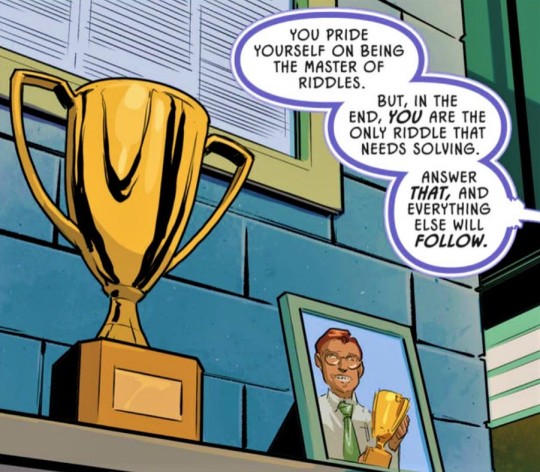
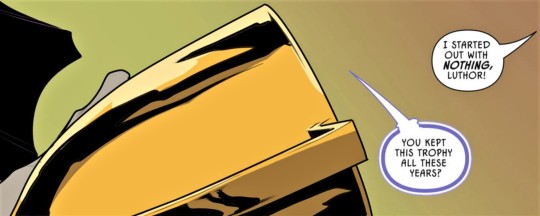
Unlike previous iterations of the character, however, there’s no obvious indication that Edward cheated in order to win it (other than the looming shadow of his future careers). Whether he won it fairly or not, winning the trophy was a turning point for him because it was the first time he was given undiluted positive attention, something he wasn’t getting at home.
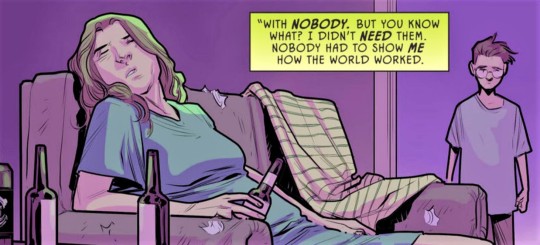
Edward’s mother is heavily, HEAVILY implied to be an alcoholic (like there are even more bottles lying around in this panel, I cut them out for the screenshot), and he himself implies in the narration that she was neglectful to the point that he pretty much had to raise himself. Interestingly, there’s no mention of an abusive father, which is the bog standard for Riddler backstories in previous continuities. There’s nothing contradicting the existence of an abusive father in addition, so obviously there’s room for headcanons here (though I’m enjoying that Jonathan’s New 52 daddy issues replacing his retconned Post-Crisis mommy issues was finally mirrored by Edward’s Post-Crisis daddy issues being retconned and replaced with New 52 mommy issues. It’s equality).
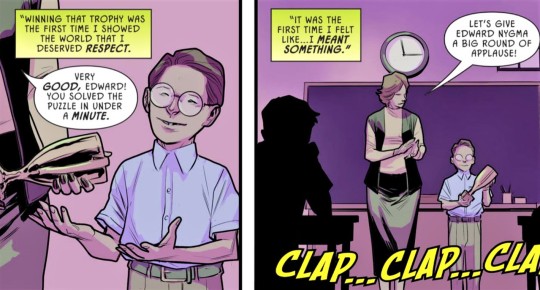
[Side note: apparently his actual birth name in the New 52 IS Edward “Nygma,” which is also a return to form to his first origin. Personally I’m much fonder of him being born “Nashton” and changing his name as an adult, but that’s just me.]
He says that winning the trophy was the first time he “felt like [he] meant something,” which would seem to indicate that before this he’d internalized his mother’s neglect into a low sense of self worth. Unfortunately, it doesn’t seem like the high of winning it lasted very long, since his classmates weren’t very appreciative of his victory (which is also very in line with Edward’s previous origins, especially Chuck Dixon’s take in Questions Multiple the Mystery).

There’s not much other information about his childhood available, though Batman Annual #4 does seem to indicate that unlike many of Batman’s other villains, he did grow up in Gotham.

This is just based on him telling Bruce that “all of Gotham City” watched him grow up, and that Edward in particular read and watched a lot of tabloid news about Bruce when they were adolescents (is this a Batman Forever reference??? It’s probably not a Batman Forever reference).
Teenage Years
Assuming we’re supposed to take Bruce’s heat-of-the-moment psychoanalysis in Zero Year seriously (Edward is clearly irritated by it, so... confirmation?), Edward’s desire for attention in childhood results in him breaking into corporate data banks and government safe-blocks as a teenager.
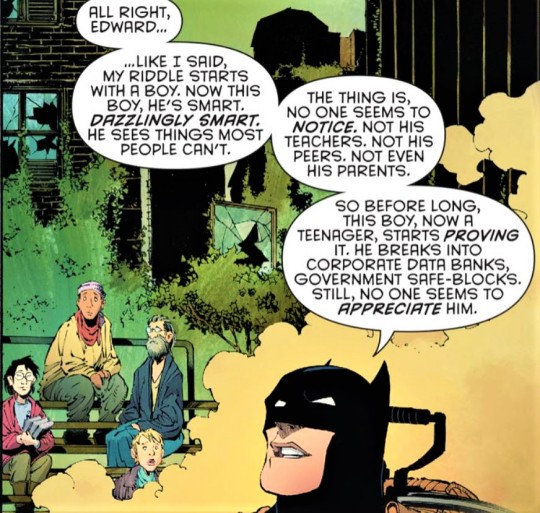
Given what Edward is capable of in Zero Year, this definitely doesn’t seem out of the realm of possibility, but it’s deeply hilarious in the context of what Year of the Villain confirmed he was (also?) doing as a teenager, which is working as a carnie.
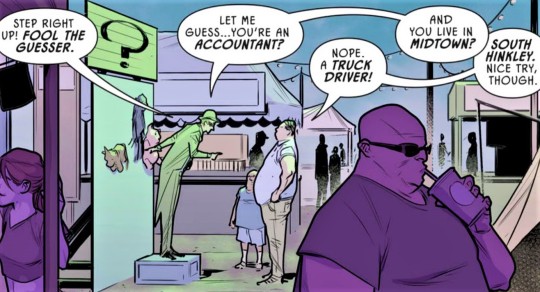
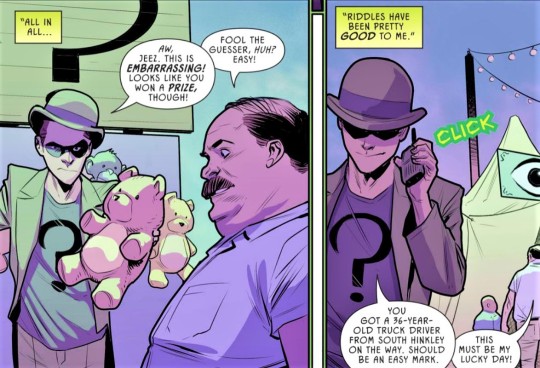
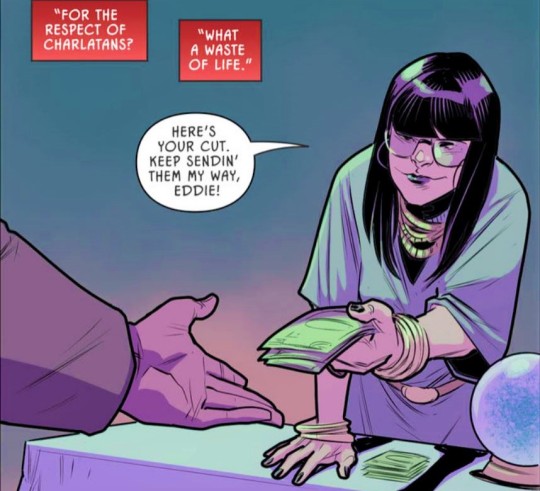
I cannot tell you how hilarious I would find it if THIS is the “questionable past” that Bruce’s Uncle Phillip was talking about during Zero Year, but presumably he’s referring to the same kind of high profile crimes that Bruce was.

But seriously, how funny would it be if he was just talking about how Edward literally ran away from home to join the circus as a teenager...
Adulthood
The 2017 post theorizes that Edward started working for Phillip at Wayne Enterprises in his early twenties, and started earning the various degrees you can see stacked up in a corner in the image above during his employment there. That would seem to fit with this timeline, since I’m not willing to add “earned six different university degrees” to teenage years that are apparently already packed full of ripping off carnival goers AND corporate espionage.
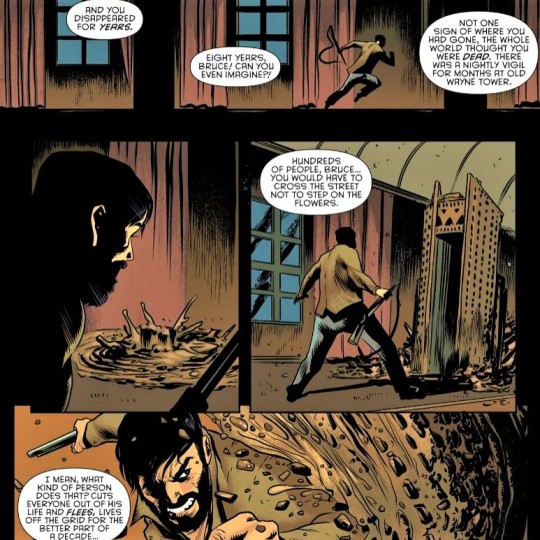
In Batman Annual #4 there is the BAREST indication that Edward might have started working at Wayne Enterprises early into Bruce’s sabbatical abroad, since he talked about how “for months” there were nightly vigils at Wayne Tower where there were so many flowers people would have to cross the street not to step on them. Presumably this would have only been in the first year of Bruce’s disappearance, when Bruce was 18; at the very least this indicates that Edward still lived in Gotham when Bruce left, though it would make more sense for him to be visiting Wayne Tower as Phillip’s strategist than as a hacker/carnie.
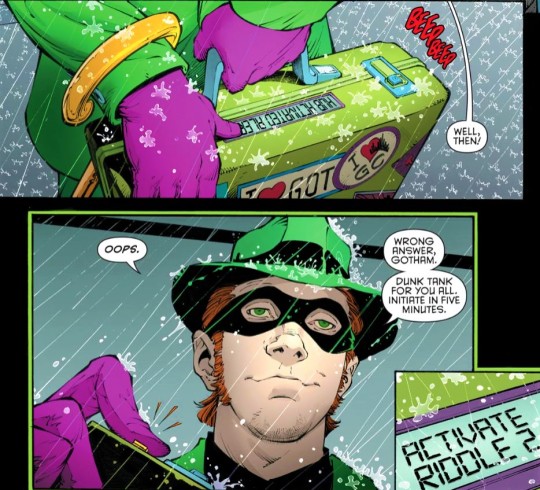
In general though, Edward’s Zero Year plan is so ridiculously complex that I think it’s reasonable to assume that he took as long to prepare for his debut as Riddler as it took Bruce to train to be Batman.
[Another side note: Not to accuse Edward of projecting or anything (God forbid), but I think it’s interesting that Edward puts so much emphasis on criticizing Bruce for “disappearing for years” and “making everyone think he’s dead” in combination with the COMPLETE absence of his father from his origin story as presented in Year of the Villain.]
I do think it’s fascinating that Edward’s New 52 origin veers away from the whole “cheating” thing that’s so central to his character in previous continuities - not that he DOESN’T cheat when he feels like it (the whole carnie thing), but it’s not presented as an insecurity of his, and here he’s genuinely intelligent enough to mastermind crimes without needing to move the goalposts at the last second (cough Arkhamverse Riddler COUGH).
One final thing from Edward’s adult life that I think could relate back to his origin comes from Batman #23.2, “Solitaire.”

The issue starts with a flashback of Edward having a deck of playing cards confiscated from him in Arkham because he was playing Solitaire (like, genuinely playing Solitaire; he actually wasn’t plotting anything, it was just for stress relief). The comic is his quest for violent revenge against the Arkham guard who took his cards, which initially seems like a pretty average example of Riddler Brand Pettiness, but the story goes out of its way to highlight how much this really bothered him.
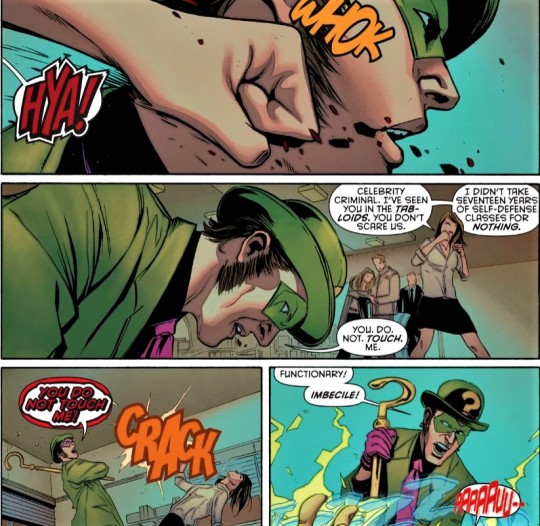

The Arkham Guard has moved on to become the head of security at Wayne Enterprises, so to get revenge Edward has to break into his old place of employment. An unexpected altercation with one of the executives leads Edward to totally freak out over her “touching” him, and afterwards he goes to meditate in her old office in order to calm down. His attempt to relax is interrupted by his old Arkham tormentor, who gets in a couple shots at him before Edward takes his revenge...


...which is BLOWING UP THE ARM that the guard used to take away the “small comfort” Edward had in Arkham. Afterwards, he goes up to the roof to play Solitaire, seeming to finally relax from his agitation earlier.
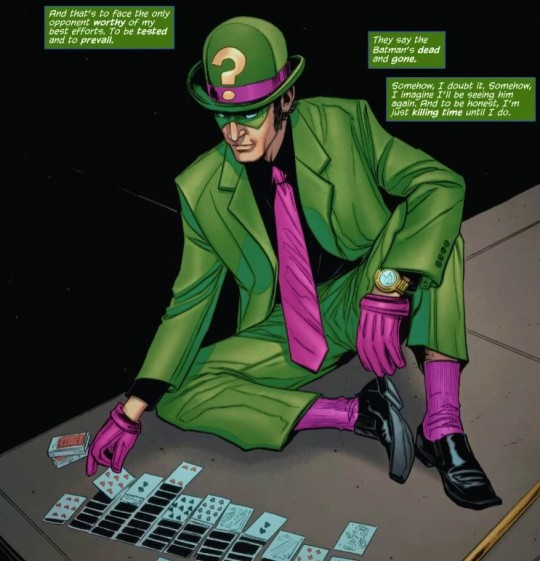
Given Edward’s isolation and neglect in childhood, it would make sense for him to have ended up playing Solitaire a lot: it’s a game that doesn’t require involvement from friends or family, but still requires a player to use strategy and skill despite the lack of an opponent.
[Yet another side note related to the previous side note: Batman is ACTUALLY dead during Solitaire, which takes place after Joker’s Endgame arc. Bruce and Joker are of course later resurrected through shenanigans, so Edward is right to think he’ll be seeing Batman again. But Riddler sitting on the Wayne Enterprises rooftop, indulging in a self-described “small comfort,” waiting for a man who’s disappeared to miraculously show up again is really interesting. Again, not to accuse him of projecting or anything, but... where’s your dad, Edward...]
His affection for Solitaire is also interesting, in the sense that one could argue that’s what he’s doing in Zero Year: playing a game with himself. He’s challenging other people to play with him through his “riddle” game, and he’s clearly prepared for the possibility of having an opponent (given that he has a whole rainbow disco death trap room set up at the end of Zero Year, which he seems DELIGHTED to have a chance to use), but he’s not expecting to have one. Whether this is a perspective rooted in his childhood or not, it seems to have changed after Zero Year, based on his riddle for Batman in “Alone.”
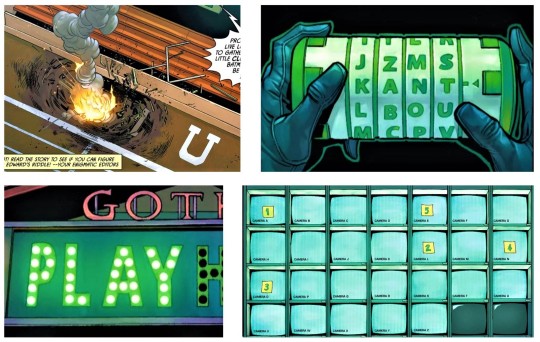
#riddler#edward nygma#zero year riddler#meta#if i missed something PLEASE let me know#i am by no means an expert on comics#i was considering titling this post 'here's how edward nygma can still have daddy issues in the new 52'#but ultimately i decided that was both not funny and not comprehensible#there are new bernie memes now#BUT i stand by it as a thesis statement
297 notes
·
View notes
Text
If You Love Me || Sylki Fanfic
...really love me
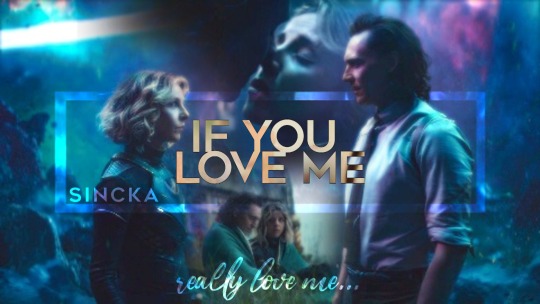
Loki x Sylvie fanfiction
[LOKI FINALE SPOILERS]
dt @entertainmentforgods
(every mean comments about this ship will be deleted. If you don't like this ship, please just ignore.)
They did it, it was over. The impossible had come true.
Their heart beating wildly, the anguish of their uncertainty gradually fades as they understand the finality of it all.
Loki and Sylvie had joined forces to destroy the true mastermind of the TVA. The overpowered individual who pulled the strings behind the curtain.
The Goddess of Mischief dropped her bloodstained sword on the dark ground, making a loud metallic sound. He Who Remains had just gave his last breath.
Sylvie took a deep breath while staring at the inert body of the one who called himself The Conqueror. As Loki stood behind her, he watched her worriedly. She had just accomplished what she had fought for all her life. So many years feeding a justified anger towards one man, for it turned out that the Time Keepers were nothing but a sham. So many years of hiding, of surviving in the midst of so many apocalypses instead of just living fearlessly. Instead of living happily, instead of laughing, smiling, dancing, singing, enjoying the present moment, observing the universe and its many wonders without them being destroyed around her, loving and being loved in return... All of that was taken away from her, because The Ruler had decided to do so. Because only one man had made the decision to sacrifice her timeline and her family and those she loved. She had lost everything as a child, because a human had condemned her existence.
And now, the latter had just died. He had lived millions of lives, and the last had just ended, killed by the vengeful hand of an innocent orphan.
Slowly, Loki moved closer to her as he kept his eyes on her. Then when he was right behind her, he gently took her hand to try to get her out of her torpor. Her face turned to him as her gaze was drawn to the ground. She was still trying to regulate her breathing and realize the previous events.
"Come with me…" He half-murmurs, his blue eyes tinted with green watching his partner's reaction carefully, anxious to see her breaking down despite her strength to contain her emotions.
It was then that she nodded softly, still too absorbed by this decisive moment in her life. Sylvie turns to him with the intention of following him, no matter where he wanted to take her.
A few seconds later, both found themselves outside the entrance to the Citadel.
Loki went down the few steps, before sitting quietly on one of them. His teammate was not far away and she watched him get comfortable, while thousands of thoughts jostled in her mind. Curious, Loki brought his attention to her. When their eyes met, she began her steps to him to sit beside him on the step.
A deep sigh escaped her lips as she sat down comfortably, her eyes fixed in front of her, finally noticing the awe-inspiring beauty of the sacred timeline they both would have admired sooner if it were in a less disastrous context. But now as they ran after time, it was as if it has just stopped.
The variants observed this painting before them, this masterpiece born from space and the end of the universe. For a moment, a pleasant silence rocked them in a surreal dream. Their eyes shine brightly, illuminated by the cosmos and time materialised in a perfectly fluid and sparkling line. But also, their intense feelings took over and tears had formed.
Hesitant but at the same time strangely confident, Loki turned to Sylvie, only able to imagine how she felt now.
"You're okay ?" He dares to ask softly.
Suffering of an internal conflict, Sylvie keeps her eyes wide open and try to look indifferent.
"I accomplished my mission, how do you think I feel ?" She replies naturally, almost on the defensive.
"Relieved ?"
"Yeah, among other things." She confirms with obviousness.
Amused by her slightly aggressive responses which, according to him, are what make her what she is, the god of mischief ends up stretching a tender smirk, realizing that this tone will never leave her no matter the situations in which they find themselves, as dramatic and catastrophic as they may be.
Innocently, Sylvie ends up looking at her partner.
"Why do you smile ?" She asks.
He smiles a little more.
"The real question is... why don’t you ?" Loki retorts, eyebrows raised.
The Enchantress raised her eyebrows in turn, that desperate, lonely look that makes her charm appearing on her face. What to answer to that? She had learned that Loki was insightful about her, but she wasn't used to being the center of attention that much.
"Why seek answers to trivial questions." She asks rhetorically as she looks away from him.
After a while, Loki also turned away, dissatisfied with her answer but still preferring to let go.
"So this is it..." He starts. "It's done."
"It's done." Sylvie asserts, nodding her head a little.
His eyes going here and there, Odin's son was asking himself lots of questions. Including one in particular.
"What do we do now ?" He wonders, seeming lost.
Sylvie took a deep breath again, ignoring like him the future of events.
"Should we go back to the TVA ?" Loki continues, bringing his gaze back to the one person he trusted.
"Why ?" She asks softly. "They don't need us anymore."
"But we don't have to hide." He responds with a comforting smile. "We are their allies."
"Is that what you want, to go back to the TVA ? But to do what ?" She asks again, looking into his eyes.
He thought for a moment, trying to unravel this enigmatic knot, stepping into the unknown.
"The Sacred Timeline is free" He said, emphasizing the first words in an exaggerated and caricatural way. "Maybe once we get there, we can look for another timeline where we can... fit in ?"
A silence took hold of them, leaving for only words the looks they exchanged.
Sylvie then ends up lowering her gaze in the direction of her own hands, revealing between her fingers the object that the Conqueror kept around his hand. The tempad.
"How about we take a break, until one of us finds a place to go ?" She offers softly, lost in thought as she doesn't take her eyes off the object.
"What, here ?" Loki asks, uncertain and surprised by her answer.
"Why not..?" She replies, her eyebrows raised, her mind being elsewhere. "When you've seen thousands of apocalypses, The Void isn't as bad as it seems."
Loki takes the time to consider this idea, thinking about everything else. The members of the TVA, the sacred timeline that has become completely independent, the very few people to which he is attached. They had just accomplished something huge, should they just ignore the multitudes of consequences their act caused ?
"It's over, Loki." Sylvie said, looking up at him.
Again, his gaze plunged deeply into her eyes
"We did what we had to do." She continues, looking serene.
"What if they still need us ?" He asks, referring to the TVA, specifically Mobius and hunter B-15, the only two people who believed in them and offered their precious help.
Sylvie watched the sacred timeline as it gradually divided, and she sighed.
"I am tired." She admits, ignoring Loki's question. "And you ?"
Loki admired the many timelines that continued to split, before taking a deep breath.
"Yes, me too..." He answers softly, releasing his breath, releasing the pressure he had been holding since his arrival at the TVA and which he hadn't known he had kept in him all this time until now.
However, he couldn't shake off his negative thoughts and all his apprehensions about the completion of their mission and the impact it will have on the trillions of people the universe can create. The god of mischief had, against all odds, developed a conscience and a moral code. Yes, they had delivered the world by giving it back its free will. But for some reason that he didn't quite understand, he began to doubt.
And buried into his torment, Sylvie brought a comforting hand to his.
Loki laid his eyes on this delicate hand, yet belonging to that of a warrior, his heart missing a beat at the gentle contact of the one he had become crazy about. In this moment of complexity, in this major turning point for the multiverse, he almost forgot his feelings. He almost forgot the way they looked at each other in the Citadel as they walked into the darkness. He almost forgot the moment she had gripped his hand in the Void, in front of Alioth, hoping to help him unleash his enchantment powers.
Suddenly caught up in his emotions, he looked up uncertainly in the direction of his partner. Then, she gave him a brief smile, but oh so genuine. The same smile she had given him on Lamentis, while everything around them was death and destruction. Apparently everything was written. But he decided to ignore this detail that the conqueror had shared with too much pride.
Still confused by these unusual feelings, Loki returned that affectionate and heartwarming smile. Only, looking into her expressive eyes - but in the greatest secret, a loving gaze- he realized that the very thing he wanted above all now was to never leave her again. To stay by her side, as long as possible, even forever, better than that : beyond death. His desires made him all the more nervous. He never thought he would be so consumed by his moods, let alone by a loving emotion that possesses him more and more after each day he spends in her company. Nevertheless he wanted to seize this desire and make it come true.
This time, it is the TVA that he forgets, it is the universe that he neglect, it is the time that he ignores.
It is his glorious purpose that he gave up, because he found a new one...
"Sylvie..." He said, drunk with love for her. "I..."
"No, Loki, wait." Sylvie interrupts him, being totally lost and frightened at the same time. "I have to tell you something..."
"Yes ?" He asks, innocent, patient, in love.
She looked at him intensely, trying to express herself. Something seemed to upset her. Loki was trying to read into her eyes, to read her face, when no word could break the barrier of her lips. Disturbed by this confession, it turned out that it was getting stuck between the walls of her throat.
So the Prince of Asgard frowned, intrigued by the torture she was inflicting on herself through this mysterious revelation.
"I..." She starts before her lips instantly seal.
She took a deep breath, bracing herself for another attempt, as Loki's piercing, loving gaze dug into her pupils until it consumed her whole being.
When finally, in complete disarray, she ends up throwing herself at his neck.
Her lips crashed against his, tenderly, passionately but mostly timidly. Surprised but more than grateful for this proof of unexpected love, Loki was not long in returning her kiss with just as much fervor.
Sylvie had never been attached to anyone. She never wanted to be weak because of her feelings. She would never have dedicated herself to someone body and soul, for trusting and breaking down the imposing and solid walls she had built around her was inconceivable. And yet, faced with the many selfless acts of the one who had irrupted into her plan, she had found herself giving him importance. She hated knowing that she was only considering trusting him. She hated the fact that he could climb these walls she had locked herself between.
Worse yet, she was terrified to find herself reaching out to help him climb.
Eyes closed, they kissed each other with fragility, embarrassed to feel such intense emotions but oh how much they surrendered to them.
Sitting side by side, they relished this moment of sincerity and calm after all they had endured. The highlight of their journey. The completion of a battle for freedom, the same cause that the rightful king of Asgard fought against to make it inaccessible to the people of the earth. This cause that he finally chose to defend ; for him at the beginning, but for her on the way, and for the others at the end of their fight.
Slowly, they parted. Loki then dared to rest his forehead tenderly against hers. They kept their eyes closed, as if to immortalized this moment in their memories, for who knows what might happen to them tomorrow.
That's why he whispered these few words :
"You're right, I... I'm a little tired..." He admitted again hesitantly, unsettled by this moment of pure sincerity.
Keeping her forehead against his, Sylvie nodded gently, not daring to open her eyes to face the truth she still had trouble swallowing.
"Let's stay here..." Loki continues.
"Only for a little while." She continues nervously, muttering her desires like him, probably too afraid that someone will hear them or too embarrassed to admit she is weak in front of him, while he is weak in front of her.
"Yes, after all... If something goes wrong, they know where to find us, right ?" He responds with a raised eyebrow as he still kept his eyes closed, trying to reassure himself by making excuses to stay.
"Yeah, of course, nothing prevents Mobius from coming back here." She confirmed casually.
"Well, unless... Unless he had to prune himself." He said worriedly. "But it’s not as if we have no way to reach them !" He adds anyway, optimistic and trying not to feel guilty.
“Yes ! We have the--” She mimics his optimism, as she pulls away from his forehead to observe the object in her free hand.
"T-the tempad..." He confirms by muttering and nodding his head, bringing in turn his attention to the latter.
The taste of her lips was still too present on Loki's for him to think properly. However, he was trying.
Shyly, he finally looked at her again, a quiet smile displayed on his face.
Of course, Sylvie had noticed it. How to ignore him ? So, embarrassed, she gave him an uncertain look, having no idea how they should react now. After all, despite their thousand years of life, the variants had never really been devoted to feelings or romance that seemed more than superfluous and unnecessary at the time. Although they were aware of their emotions, repressed or not, knowing how to react to them was still an area to be explored.
The landscape around them gradually brought her back to reality. Then, looking worried, she turned her gaze to the entrance to the Citadel. She remembered the corpse of the He Who Remains, the one who had wiped out her timeline and certainly thousands more.
Loki frowned, noticing the change in expression on his partner's face.
"Are you sure you’re okay ?" He asks once more with patience.
Lost in thought, Sylvie continued to look at the place where everything had changed with a blank stare.
"No..." she sighs slowly.
The god of mischief was envious to possess the complicated mind of his variant for the sole purpose of finding the source of her ill-being. It would be enough for him to touch her to enchant her, now that he knows the secrets of enchantment. However, would he dare ? He hesitated for a fraction of a second, before totally rejecting the idea away from him. He was incapable of defying her trust, for he knew full well that he would risk a lot if he tried. Especially since he was still cruelly lacking in experience concerning enchantments.
"But when I wake up tomorrow knowing that the one responsible for all this horror is only a memory, then I could savor every second of my life." She asserts returning her attention to Loki as if nothing had happened, speaking with confidence and lightness.
Perplexed but somewhat reassured, he just nodded briefly, straining to accept her answer. However, something in him told him that she wasn't being entirely truthful.
"...Glorious purpose." He said, trying to lighten the mood.
"Mh..." She only answers, a quiet smirk nestling in the corner of her lips.
Calm eventually took over. Neither of them spoke, only watching the story of trillions of lives forming before their eyes in those many fluorescent lines.
"We're not leaving." He speaks up, his statement sounding more like a question mark.
"We're not leaving." She repeats with a little more conviction than him.
Slowly, he finally took a light breath, before sighing in contentment.
After an extremely difficult journey that could have cost them their lives, even though the Ruler had decided that they would be spared so that they could both achieve their goal, they were going to be able to rest, they were going to be able to breathe. Because even if the gods have more ability than humans to resist fatigue and pain, they could do nothing before the effervescence of their emotions. And as tough as they could be, they were tired, mentally and physically.
Thereupon, on this mutual agreement, the two variants had decided that it was time for them to rest for a while. They didn’t know what they were going to do. But they had decided to figure this out…
Together.
#sylki#pro sylki#sylki fanfiction#sylkie#love is a dagger#loki x sylvie#loki spoilers#loki series#tom hiddleston#sophia di martino#loki#loki fanfic#sylvie#sylki au
50 notes
·
View notes
Note
I love to boring you but what do you think of Murad IV in MC:Kosem ? I really like him but he seriously need of a therapy with a psy *a great one !* and i don't think he treated Ayse (or Farya !) correctly ! He is trash (more trash than any others characters i think) but i also like her complexity. How do you find him ? Do you think he deserve more recognization like Selim or not at all ?
I don't like him one bit as a person. He's problematic, hypocritical and abusive and his actions go beyond every sort of justification, no matter how much he tries to justify them himself. However, he is interesting and complex as a character and you can still see where he comes from and how do his beliefs unfold. He clearly has a detailed arc; and that arc causes him to be way more paranoid, way more selfish, way more overindulgent, which was to his detriment.
Let's face it: the show portrayed him as a very bad ruler (I spoke about why here) and from what I've read, historically, he isn't any better, either. I don't know what does he deserve to be recognized for, aside from the conquering of Baghdad, which did nothing to absolve his crimes in the show, aside from how well-written he is. Any possible redeeming quality of his is destroyed by all his problematic actions piling in and all we've left is a nuanced exploration of his problematic traits. With MC Selim we have a much more understandable circumstance, the child neglect which explained his drinking and lay low tendencies and why it looked like he didn't care for what the other brothers did. Thing is, Selim arguably wasn't all that problematic at first (the provocations between him and Bayezid were more mutual than anything else) and what really pushed him to "villainy" was the death of Mustafa and Cihangir, the complete destruction of the concept of brotherly love in his head. His redeeming qualities were as balanced as his "villainy" and you see within how human he is and how everyone around him who wasn't Nurbanu did somewhat screw him over from the start. The nuance is on his entire persona, not on his problematic deeds. I do believe that MC Selim's writing should be way more respected, because of all the nuance. I don't think he's fit for a padişah in the show, but he isn't some cardboard cutout who only drinks and schemes. He has actual issues, desires, sensitivity, vulnerability and compassion. Murat is a different kind of a character. He's both a bad ruler and a horrible person, he doesn't really have a transitional point to begin his problematic deeds, since he's like this in the beggining. He has his reasons in his backstory, but they recontextualize his paranoia, not what comes out of this paranoia. His transitional point was more him getting even surer of his beliefs than beggining a path of ruthlessness. Worse, it strips him from any possible scruple he had deep inside and what we would see from this point on is his further moral descent and nothing else. He has two areas of justification: a fragment of his past and the "Shadow of God" mentality that only ring more shallow the further we go. (it's fascinating writing-wise, but that's about it.) With Selim at least we have his motives becoming stronger the more we go and watch him succeed. They're different thematic explorations altogether and one of them isn't much on the sympathetic or deserving of recognition spectrum by design.
What I like the most about Murat's writing is that no matter how strong and dangerous it is, his paranoia comes from a real place. While with Süleiman we only had hints of said paranoia in a few flashbacks, with Murat we had an actually devastating, shown on-screen event that had the harder job of making such sudden by the show change more believable. Murat, for whatever he is, is shown a tiny bit of understanding by the script when there actually are people actively working behind his back. Süleiman assumes he's been betrayed, but since the events that open his paranoia are mostly events molded or completely taken out of context and no one actively works behind his back until much after said paranoia was allowed to occur (even Mustafa's organization worked primarily against Hürrem, not SS, one attempt to kill SS aside, which the object of his paranoia saved him from!!!!) - we, as audience, have no reason to buy it whatsoever, which brought the understanding for SS soo down for me. But Murat's paranoia made him go way out of proportion to the point he went even further than SS by willing to end the whole state so he could be there and rule. And just like SS, his paranoia quickly became all selfish in nature to the point of alienating everyone around him who wants to give him decent advice and thinking himself as right all the time. He wanted to be a lone wolf, driven by toxic masculinity from the start. And him feeling overshadowed by Kösem... no matter how understandable it has the chance to be because of the time period, made him blind and instead of gaining experience in order to rule unscathed and firm, he decided to fixate himself on the past and on his role and possible deep-seated resentment of his mother, he made all the wrong decisions in every aspect of his life.
His anger issues are especially illuminating, since he tends to lash out on the slightest thing gone wrong, to the point of exercising physical violence. His anger probably stemmed from how he could only watch during Osman's death and the subconscious blaming of Kösem because of it, along with Musa's death and them not giving him time to shine, something he thought belonged to him and was his right, but by ruminating on all this, he, once again, focuses on his own feelings and own world, he, once again, reaches devastating extremes. Anyone who ever tries to defy him suffers from this. Anyone who tries to defy him is evaluated by how much he's fitting for his mold, for his world, something far beyond a wish for loyalty.
He didn't love any of his women, IMO. His physical violence and abuse was highlighted by his dynamics with them the most and he always decided on the harshest punishments when it came to them. One might argue that his relationship with Farya played its part in somewhat humanizing Murat and disguising this overally questionable at its impossibly best love story for ratings and stuff, but the more we went, the more abusive it got and Farya could never get over his unpredictable and turbulent nature that strived to strictly control every single thing that was close to him to toxic levels. I won't even begin with how he treated Ayşe, because that was such a trainwreck and she deserved much better than to constantly fear for her life, because this guy could go immediately crazy and kill her and her kids. With Sanavber it was only slight infatuation and that's all for me, because in that point, I doubt this guy was capable of love. One Murat went and there came the other before Sanavber arrived and Murat was on the path to become his cruelest self.
All in all, I don't mind anyone going out there and trying to explore him ( in fact, I would actually love such discussions!), but he's hot trash, he should die in fire along with Süleiman and I'm struggling everyday to declare which one is worse in my book, because they suck the same for me, but in different ways. I appreciate their narrative roles, but otherwise... screw them both.
#magnificent century#muhteşem yüzyıl#muhtesem yuzyil#magnificent century: kösem#magnificent century kösem#magnificent century kosem#muhteşem yüzyıl kösem#murad iv#ask#misssyivertongue
19 notes
·
View notes
Text
I feel like I cracked the code on why in the 'exchange of winnings' part we don't get Gawain giving the Lord anything.
In the poem everything is more clear-cut, Gawain kisses Lady Bertilak out of courtesy, but considers it his winning, because he's attracted to her and gives back the kisses to Lord Bertilak, since that was the deal and he doesn't feel guilty for it (in a gross simplification, but essentially). In reality (well, in a world where people are actual people with complex thoughts and emotions and fears) it would never be this easy, and that's what the movie depicts.
Movie Gawain has to navigate a social situation so complicated there is no way of coming out of it with clear conscience. The kiss on the cheek the Lady coaxes him into is not a winning, but rather something that was taken from him, a test of how far she can go. Then when she offers him the magical green sash, what transpires is difficult to consider a winning either, because once again, what she does to him when she makes him admit to desiring her and to beg for the sash is on the line between persuasion and coercion. She intimidates him, not just with her beauty, turning the act into not a gift-giving, but an exchange, almost a transaction. Gawain has all the right to flee in horror once he realizes the dubious nature of what happened. He needs to consider what is actually the truth for him. Did he actually want it? All of it? Was he just so afraid of dying he lost his restraint? Or was the sash the only thing he wanted and he gave himself to her like a harlot? (a reversal of his relationship with Essel, who, after all, has the same face) Did his own body betray him? Was he even aware in the moment what was happening? Does it matter for the Lord? Did he break his trust or was he used? Should he feel ashamed? And ashamed for being weak-willed or just weak enough to become a prey? Does the sash count as a winning if he paid for it? Does being touched (excuse the euphemism) by the Lady count as a winning if he isn't sure about the other answers? He's scared and confused, and not willing to think about it any further with the Green Knight's axe hanging above his head (still only figuratively).
And then he stumbles into the Lord in the woods and how should he know what to do? It's not just cowardice, it would be much simpler if it was, but he started to bond with this man. The Lord is not as intimidating as the Lady, but when he asks for the winnings Gawain can neither lie, nor tell the truth, because he doesn't know what the truth is and if he didn't misplace his trust in him. The Lord isn't a saint, he came up with the exchange of winnings in the first place, but he's practically the opposite of the Lady. He says he wants to *take*, but the kiss he shares with Gawain is a far cry from the other scene. It's silent and gentle, and in the end is not a payment for anything, not tonally, rather just something the Lord gives him, together with all his other finds on the hunts, and that's why it doesn't correspond to any of Gawain's perceived 'winnings'. It's just an invitation, a question (in a way, it's his way of asking for consent, the lean-in I mean, because the actual /finalized/ kiss, and Gawain pushing his hand away after is the answer, and the answer in plain English would be something like 'Yes, but no. I don't know' ['Why would you ever ask me that?' callback, right? No? Moving on.], so not enough to push further, and the Lord doesn't, bless him for not being as big of a creep as the Lady, who decided lack of a verbal refusal is consent. Hint: it isn't.)
This kiss Gawain could freely refuse, and there is nothing to gain from accepting it, as he's already leaving and heading (huh! heading! you could say be-heading ;) ) for his own death, but he does. And that's why I believe Gawain was attracted to, or at least curious about the Lord and only pushed his hand away, because of, well, everything else. But that's a different discussion/story/animal altogether.
TL/DR Read the whole post, I can't summarize it in one sentence other than 'the winnings are not actually winnings and the exchange doesn't occur at all, except when it maybe does, but in different context'
11 notes
·
View notes
Text
“Texts about petty treason clearly depict where and how women murder their husbands, but they have more trouble explaining why women do so. Just as the murderous wife challenged the conceptions of women's legal and moral stature on which marriage and social order depended, she also posed a problem for the many writers-hacks, ministers, legal personnel (judges, justices of the peace, clerks, and theorists), chroniclers, playwrights, and balladeers-who rushed to tell and sell her story. These authors attempt to tell a story in which a wife becomes the protagonist without conferring too much authority, prestige, or sympathy on a criminal, married woman.
For only through transgression could such women, usually wives of yeomen, shopkeepers, tradesmen, and small landowners, demand attention outside of the household and neighborhood; only thus could they become the topic of debate in legal treatises and on streetcomers, the focus of attention in courtrooms and on scaffolds; only through transgression could they command a place at the center of a popular narrative as the protagonist of the story. If killing her husband made it possible for a wife to be at the center of a story, it remained a difficult story to tell. Certainly pamphlets describe who did what to whom with ease. Yet the texts that struggle to tell the story of a wife's transgression attempt to redress it through a didacticism that restricts the narration of her motives and desires.
Once the writers begin to explore motives, they lose control of the moral of the story, for the more the reader engages with the wife the less simple the lesson becomes. To imagine, let alone sympathize or identify with, the frustrations of a wife is to question the legal and moral assumption that in the household there is only one citizen, one legal agent, one property owner, one decision maker: the husband. Some sixteenth- and seventeenth-century texts employ an explanation for the behavior of murderous wives that we often see in today's news and in popular culture; they represent the murderer as a battered wife who resorts to violence in despair and self-defense. Contrary to reductive analyses of the early modern family and the position of women in it, these period texts suggest a popular perception that husbands sometimes beat their wives to an extent that exceeded lawful correction and prudence and that beatings put wives in "a fit humour for the devill to worke on."
Alice Clarke, for instance, is described as having visible bruises at the time that she is apprehended and examined for killing her husband. Even Henry Goodcole, the minister who counsels her and writes the gruesomely titled The Adultresses Funerall Day (1635) about her case, sees a connection between those bruises and her actions. The beatings described in such texts include not only drunken and impulsive assaults "with the next cudgell that came accidentally unto his hand" but also sadistic, eroticized rituals, such as "tying her to his bed-post to strip her and whippe her, etc." Although pamphlets exploit the titillation of such stories, despite the coy propriety of that "etc.," they also suggest that husbands could be uncontrolled, savage, and "unnatural," and that wives, especially those isolated from friends and neighbors by shame, distance, and religious or ethnic difference, might have felt that violence was their only recourse.
Under common law, husbands had a legal right to beat their wives; however, the limits on this right were debated in conduct literature and explored in ecclesiastical courts when members of the community feared that excessive beatings threatened the wife's life and the peace of the neighborhood. The law did not spell out the limits on discipline except to assume that husbands did not have the right to kill their wives. As Martin Ingram explains, "Domestic relations were thus on the borders of public and private morality in this period-matters to be influenced by exhortation but not ordinarily by the exercise of formal discipline." To say that domestic relations remained outside "formal" discipline is not to say that they were unobserved or unregulated; neighbors and the local community exerted informal control over marriage and domesticity in many ways, including confrontation, shaming rituals, and bringing the offending couple before the justice of the peace for "unquietness."
A husband's authority over his wife remained legally and morally ambiguous, even if the community's scrutiny constrained him. Since a husband's treatment of his wife remained largely beyond legal regulation, conduct literature appealed to the husband's judgment, urging him to regulate himself. In one of the many discussions of wifebeating in conduct literature, William Gouge suggests that beating one's wife undermines household governance because it opens up a space between the husband and wife, revealing that they are not one flesh, not one legal agent, but two: "Now a wife having no ground to be perswaded that her husband hath authority to beat her, what hope is there that she will patiently beare it, and be bettered by it? Or rather is it not likely that she will if she can, rise against him, over-master him (as many do) and never doe any duty aright?"
The husband's violence threatens to incite a contest for mastery; once the context of violence enables the wife to enter the fray as a combatant, the outcome is uncertain. One account of a wife's reaction to a marital rape, which we might not expect to find recognized as an offense in this period, clearly shows how a wife's subjectivity is constructed as violent, as a choice of her own life over her husband's life. In her examination recorded in A Hellish Murder (I688), Mary Aubrey (or Hobry), a French midwife, describes a history of dissension with her husband because she would not cooperate with him "in Villanies contrary to Nature."
On the night of the murder, after beating her savagely, "he attempted the Forcing of this Examinate to the most Unnatural of Villanies, and acted such a Violence upon her Body in despite of all the Opposition that she could make, as forc'd from her a great deal of Blood, this Examinate crying out to her Landlady, who was (as she believes) out of distance of hearing her.” When she insists that she cried out, Aubrey employs the strategy of the rape victim, who had to demonstrate that she had made a "hue and cry" and thus had not consented. In presenting Aubrey's compelling testimony about this assault, A Hellish Murder not only suggests limits on a husband's rights to and power over his wife's body but also constructs a subjectivity for Mary Aubrey out of her despair, her sense of grievance, and her determination to escape.
Aubrey finally demands of her husband, "Am I to lead this Life for ever?" only to receive more threats in response. In asking that question, Mary Aubrey is portrayed as raising a voice and imagining herself as having a life separate from and in conflict with her husband's. By depicting her reaction to abuse and her contemplation of retaliatory violence, this text constitutes Aubrey as a self-conscious, speaking subject. Later, beside her sleeping husband, she thinks "with her self," "What will become of me? What am I to do! Here am I Threatned to be Murder'd, and I have no way in the World to Deliver my self, but by Beginning with him." Aubrey's subjectivity is seen not only as the midwife's deliverance of herself but as a birth that depends on a death.
"Immediately upon these thoughts," she stoutly undertakes the murder of her husband, strangling and dismembering him, and lugging parts of his body around in her petticoat to dispose of them. Popular accounts of petty treason usually shy away from such risky representation of a wife's conscious articulation of rights that are allied to violence by their very conception. The resulting attempts both to account for the complexities of domestic friction and to achieve some sympathy for the abused wife, while keeping authority vested in the husband, however tyrannous, can verge on the absurd.
Goodcole describes one "young and tender" wife, who, repenting after administering poison to her "old, peevish," and abusive husband, fruitlessly pleads with him to take an antidote to preserve his life. "Nay thou Strumpet and murderesse," Goodcole reports him as saying, "I will receive no helpe at all but I am resolvd to dye and leave the world, be it for no other cause, but to have thee burnt at a stake for my death." * Although the wife is executed at Smithfield, Goodcole regards the husband, in his spiteful insistence on dying, as the agent. Sarah Elston, in her scaffold confession as recorded in A Warning for Bad Woo (1678), "protested again most seriously, that she never in her life had the least designe or thoughts of killing [her husband], onely it was an unfortunate Accident; and whether it came by a blow from her, or his violent running upon the point of the sizzars as she held them out to defend her self, she could not to this minute certainly tell."
These comic moments reveal how pamphleteers who wish to portray murderous wives as penitent and pitiful must awkwardly scramble to shield them from the imputation of intending to kill, just as they are presented as shielding themselves from blows. To characterize such women as assessing their hopeless situations and deciding to take violent action to escape them, that is, to present them as subjects, is also to remove them from sympathy and to open up disturbing implications about the marital relation of authority and submission. Writers in effect displace responsibility onto the husbands, positioning them as still in charge, even if drunken, violent, and absurdly self-destructive. In representations of domestic conflict in early modem popular culture-ballads, pamphlets, and plays, shaming rituals and jokes- the wife diminishes or usurps her husband's claims to authority as she asserts herself by committing adultery, beating or bossing her husband, or plotting to kill him.
For instance, Arden of Faversham (1592), a play about an actual case of petty treason, can be seen as an extended cuckold joke. Like such jokes, and like popular shaming rituals such as the charivari, the play holds the cuckolded husband responsible for his wife's adultery and insubordination. If the husband and wife become a joint subject at marriage, then, these popular representations seem to suggest, the wife's enlargement into volition, speech, and action necessarily implicates, diminishes, and even eliminates the husband. These popular representations push the logic of coverture to suggest an economy of marital subjectivity that leaves room for only one subject. They constitute the wife as a subject only to the extent that they qualify her husband's claims to subject status by silencing and immobilizing him and casting doubt on his authority and potency.
The fact that popular accounts of such crimes acknowledge the role of abuse in inciting women to murder challenges assumptions we still have about women's rights within marriage and the monolithic power wives who defied the patriarchy during this period. It also complicates the notion of petty treason by introducing the possibility of tyrannous household government and by suggesting, albeit hesitantly, that there arc some justifications for rebellion. Certainly, contemporary debates about the limits on conscientious submission to civil and domestic authorities have a bearing on relations within the household and the understanding of petty treason. Writers of sermons and conduct books about marriage explicitly include the situation of the godly wife in their considerations of the limits on obedience to earthly authority; they advocate a demanding balance between submission and resistance, silence and good counsel.
In those cases of petty treason that resulted in convictions and made it into print, however, the circumstances in the household did not mitigate the wife's guilt. These women were executed as petty traitors despite their husbands' inadequacies as household governors. Although juries may actually have taken extenuating circumstances into consideration when they deliberated over cases of petty treason, these texts hold the husband responsible as well as depict the execution of the guilty wife; they recognize limits to a husband's power over his wife, yet present a wife's violent resistance as ultimately unjustifiable and destructive of the political order. Popular representations make these contradictions between husbandly authority and wifely submission visible, but they do not resolve them.”
- Frances E. Dolan, “Home-Rebels and House-Traitors: Petty Treason and the Murderous Wife.” in Dangerous Familiars: Representations of Domestic Crime in England, 1550 - 1700
#history#frances e. dolan#cw: domestic violence#cw: rape#renaissance#tudor#elizabethan#jacobean#stuart#dangerous familiars
6 notes
·
View notes
Note
Hello This is kinda weird put I remember reading a good write-up on Miu that like Toko and Mikan she has low self esteem and never really had any friends so she literally doesn't know how to interact with people Plus she's in a situation were she can get killed in any SECOND so add these factors and I think that somewhat explains her lack of empathy and her just constantly being on edge She's in a situation were anyone she gets close to can end her life What do you think about this? Thanks
Hi anon, I don’t think it’s weird at all! Miu is actually one of my favorite ndrv3 characters; I love her to pieces and I agree with this analysis a lot! I believe she gets a lot of flack for being a female character who’s crass and rude and not very empathetic, despite people often idolizing or making excuses for male characters with many of the same traits.
To this day I still somehow see misinformation spread about Miu and used to call her things she isn’t, including blatantly untrue claims like “she forced herself on Kiibo” (which, I cannot make it more explicitly clear how much she does not do this). I’m not saying anyone has to love Miu or consider her their favorite character, I just think she gets an unfair deal sometimes.
It’s been a long time since I got to write a more in-depth analysis of her, so I’ll share more of my thoughts under the cut! Watch out for spoilers as always.
Miu having low self-esteem isn’t just a headcanon or a fan theory; it’s pretty much canon. Despite constantly acting arrogant, loud, and abrasive, Miu is absolutely desperate for validation and attention from others. For as haughty as she likes to act, she backs down almost immediately whenever someone so much as snaps or glares at her, clearly afraid that she’s somehow said the wrong thing or made someone mad at her.
In my opinion, she’s completely unaware of how she comes across to others. She wears her emotions on her sleeve and has no filter whatsoever, and this combined with her desire to be respected and praised for her talents means she’s very difficult to get along with.
I’m not making excuses for her actions; I still think some of the things she says about other members of the group are pretty terrible, and I do, to some extent, simply think she’s not really the type to empathize with others. But I do think part of it is that she’s just completely unaware of how she sounds or comes across to others. She has no understanding of social cues, or what it means to “tone it down” in order to better fit in with other people.
Obviously, it’s not like the other characters are at fault for getting fed up with Miu sometimes or not wanting to spend time with her. Like I said, she’s incredibly loud and abrasive and nearly impossible to please, especially as she’s quick to make fun of others or get mad if she thinks they’re wasting her time. But it’s somewhat… sad, in a way, to see how desperately she does want someone to spend time with her and acknowledge all her positive traits, like being an “amazing gorgeous girl-genius.” She really does strike me as someone who has probably been alone most of her life, and her inability to understand social cues or realize how she sounds to other people means that she never learns from her mistakes or gets any better.
This is part of the reason I actually really love her interactions with both Kiibo and Kaede.
I find it touching that she and Kiibo have such a consistently good dynamic even in the middle of the killing game. In the same way that Kiibo is one of the only characters openly sad after Miu’s death in chapter 4, Miu is perhaps the only character who doesn’t really look down on Kiibo for being a robot; instead, she thinks he’s the coolest person she’s ever met precisely because he’s a robot. And I think there’s a lot to be said too about how both of them are characters that really struggle with understanding social cues or fitting in with a group.
Meanwhile, Miu’s FTEs with Kaede are perhaps the closest we ever really see her get to making a friend or getting included with the rest of the group. I absolutely love how much Kaede refuses to back down whenever Miu is saying something horrible or mean or gross, and how she always puts her foot down whenever she crosses a line. When Miu tries to “compare chest sizes,” Kaede just flat-out punches her for it, leaving Miu baffled and confused, but also with a better understanding of personal boundaries.
Kaede always feels like she’s trying her hardest not so much to put up with Miu, but to understand why she acts the way she does, and puts a lot of thought into what she could do or say that would make Miu want to become more of a team player or open up to people more. The rare moments where Kaede praises Miu and Miu becomes genuinely flustered and taken aback are further proof of how much Miu really wants validation and has no idea how to go about asking for it without coming across like a total weirdo, so I have a big soft spot both for those first few FTEs with Miu, as well as some of their interactions together in the Talent Development Plan.
It’s also interesting that you should mention Miu’s fear of being killed at any point in the killing game as a big reason for why she acts the way she does. I bring up the fact that Ouma has very clear signs of paranoia and a fundamental inability to trust others a lot in my meta—and Miu is no different. In fact, the biggest reason chapter 4 plays out the way it does is because both of them are incredibly paranoid and mistrustful, terrified of getting killed, and this causes what could have been (and was, for a time) a very powerful alliance between them to completely fall apart into pieces.
If I had to draw parallels between Miu and another character, it wouldn’t be any of the other “pervert” characters in DR, or even any of the other inventors/programmers. It would be with Maizono.
Chapter 4 of ndrv3 is, in my opinion, actually incredibly similar to dr1 chapter 1: both Miu and Maizono ultimately make the decision to try and kill someone out of sheer desperation to confirm the state of the outside world with their own two eyes, and both of them ultimately have their own plan turned against them and are killed in the end. Where Maizono’s strongest driving force for wanting to get out no matter the cost is sparked by the sight of her own motive video, Miu’s is sparked by the fear that the outside world may be a total wasteland, and the knowledge that she could actually do a considerable amount of good with her talent.
It’s absolutely correct to say that Miu didn’t trust anyone else. She and Ouma both collaborated together for a time—we don’t know how long exactly, but it’s clear that they were at least working together for a while given the sheer number of inventions that Ouma commissioned from her and provided designs for. The fact remains that the two of them were this close to putting together a plan to take down the exisals so they could escape with everyone else… but again, sadly, both of them were far too paranoid for this plan to ever actually work.
Miu’s biggest problem with the plan as Ouma proposes it is that she simply doesn’t trust anyone else. All the clever inventions and plans in the world won’t pull through if even one person decides to double-cross them or simply put self-interest first. And it’s worth noting that she’s kind of right here, considering Tsumugi was very much still part of the group at this point in time and absolutely would’ve sabotaged their plan using any means possible. So in an interesting turn of events, Miu decides to put her self-interests first and commit a murder in order to escape, because she suspects everyone else of wanting to do exactly the same thing.
Overall, Miu is a deeply flawed individual. She’s loud and rude, demanding and hostile, incapable of recognizing her own mistakes, and deeply paranoid and mistrustful of others. But all of these things are very much the reason I love her. Again, she’s not for everyone. No one has to like her.
But I find it interesting that other male characters who have the same or arguably worse flaws (flaws usually stemming from misogyny, including Souda stalking and harassing Sonia for the entirety of sdr2 with no change in his behavior, or Teruteru who straight up threatens sexual assault both in sdr2 and dr3) often have tons of people willing to defend them and somehow justify their actions, while Miu gets painted as irredeemably bad or has her moments with Kiibo completely skewed out of context.
In any case, these are my thoughts on Miu’s character. I hope I was able to make myself clear! I don’t think that she’s a “poor misunderstood baby” or anything like that by any means, but I do think she’s incredibly interesting and complex, both because of her flaws and because of how undeniably useful her talent was to the group. For someone who was so adamantly against being a team player, it’s amazing how much Miu’s inventions are vital to saving everyone’s lives in most of the game’s trials. Thank you for the fun question, anon!
#danganronpa#miu iruma#iruma miu#ndrv3#new danganronpa v3#my meta#ask#anonymous#ndrv3 spoilers //#okay to reblog
82 notes
·
View notes
Note
Is it wrong to say that Sansa uses an out of sight out of mind coping mechanism? I noticed it because it's what I do a lot. I know some ppl say she rewrites traumatic memories to make the memories bearable but it doesn't make sense. If that was how she coped, wouldn't she have been telling herself lies about Joffrey still in acok? Or found a way to erase/rewrite Marillion's attempt to rape her?
Yes and no. She does that except all the times she doesn’t. ;) I think that characterization is extremely reductionist (and ignores character complexity and growth) when it’s applied that broadly to every situation Sansa has been in. You have to take these things instance by instance because they aren’t all the same. Sometimes that labeling doesn’t fit at all. In many cases, it feels more like the fandom pathologizing the act of romanticizing or trying to push aside or reframe something unpleasant or even traumatic when that’s just something most human beings do now and then. Some do it more than others, but its all within the realm of typical coping behavior and being older or more educated or more “logical” doesn’t make one immune to it. So I hope you don’t let those interpretations make you feel abnormal or more fallible for identifying with Sansa in that way. Romanticizing doesn’t even have to be about coping at all, but simply expressing desire through daydreams. People imagine being in idealized scenarios with crushes all the time.
You also hit the nail on the head. Sansa just doesn’t go around making up false narratives about every objectively awful thing that happens to her. In fact, her actual responses to those moments can be a useful basis for comparison when we’re analyzing the unkiss, for example. Misunderstanding the unkiss is usually where a lot of these assumptions stem from. That’s a whole other can of worms in itself. The unkiss is just too long of a discussion to put here, so I just recommend this post as to the reasons why it isn’t about trauma and take a browse through my unkiss tag. It does bear repeating that Sansa factually remembers every scary thing that happened during the Blackwater and why it happened, indicating she has processed it honestly and critically, before any incarnation of the unkiss happens. The unkiss is a mismemory added on to the facts, which began as her being the actor that kissed him first. It’s not a lie to deny the facts or to excuse his behavior. It’s regrettable to her that Sandor was not able to be the person she could rely on to get her out of KL at that time. Nonetheless, this repressed desire is just so strong in her that it manifested in a kiss so real she could remember how it felt after the reality of his leaving KL for good sank in.
Early AGOT Sansa tended to want to move past unpleasantness rather quickly. Just sweep those red flags under the rug so everything can go back to blissful harmony. Sansa is naturally averse to conflict and just wants her present with the royal family to be smooth sailing into a bright future. Ned had a very similar tendency when it came to concerns over Robert’s true character. He saw things that disturbed him, but he hoped and clung to his idea of Robert anyway. For Sansa, this resulted in some misplaced blame and rewriting events so she could deal with the aftermath. This is mostly seen in her processing the Mycah incident after Lady’s death and how her perception of all the characters involved shifted in varying ways. This is after she knew perfectly well what really happened, because Ned says Sansa had already told him the truth of what Joffrey did while Arya was still missing. However, it would also be unfair to completely chalk this up to Sansa’s idiosyncrasies. We have to put her flip-flopping in the context of the situation as well. She’s also experienced a gutting loss with Lady’s death and the fact that the first blow to her innocence was her father volunteering to put Lady down. She doesn’t have Catelyn to go to with her confusion and hurt, and Ned has largely been silent. She’s also still engaged to Joffrey through all this, this is still a patriarchy, there are political ramifications to speaking against a crown prince, and she doesn’t know how to deal with seeing such cruelty and vindictiveness in her future husband. Especially when he responded to her tender concern and wanting to help him with venom and hate.
I mean, jeez, she’s 11. I don’t expect an 11 year old to understand how to identify the signs of emotional manipulation or see how this situation can escalate into domestic violence. Just because Sansa can’t articulate what is happening within her relationship with Joffrey, doesn’t mean she has blocked out any notion that Joffrey can turn his anger on her. Part of the reason she misplaces blame on Arya (and rewrites what happened) is because Joffrey turns scornful of Sansa for being a witness to his emasculating shame. He punishes her with the cold shoulder because she didn’t immediately take his side and pretended not to see instead. He regains power through making Sansa feel small and fearful of his moods.
“He had not spoken a word to her since the awful thing had happened, and she had not dared to speak to him.” -- Sansa II, AGOT.
Sansa looked at him and trembled, afraid that he might ignore her or, worse, turn hateful again and send her weeping from the table. -- Sansa II, AGOT.
This is coming from someone who is supposed to love her and someone she will spend the rest of her life with. To fix things, she must be unequivocally on Joffrey’s side going forward or suffer the consequences, which we can see happening as her story completely flips over breakfast sometime later. This is not saying Sansa is fully exonerated from not supporting her sister when she needed her, but that it’s understandable how she arrived at this point. Even when things start to get really bad after Ned’s arrest, Sansa still holds out some hope that she can appeal to Joffrey’s (and Cersei’s) love for her to get him to be merciful. Is it really her fault she believed a part of Joffrey really loved her (and thus was reachable by her pleas) if he also heavily love bombed her and treated her like she was the most special girl in the world? Love bombing is a classic feature of the seduction phase leading up to abuse.
So we can see Sansa does ignore truths and rewrite events sometimes and her personality is a factor; however, the context surrounding it matters a lot. Post Ned’s execution, Sansa does a full 180 regarding Joffrey and Cersei.
Sansa stared at him, seeing him for the first time. He was wearing a padded crimson doublet patterned with lions and a cloth-of-gold cape with a high collar that framed his face. She wondered how she could ever have thought him handsome. His lips were as soft and red as the worms you found after a rain, and his eyes were vain and cruel. "I hate you," she whispered. -- Sansa VI, AGOT.
Once she had loved Prince Joffrey with all her heart, and admired and trusted his mother, the queen. They had repaid that love and trust with her father's head. Sansa would never make that mistake again. -- Sansa I, ACOK.
"A monster," she whispered, so tremulously she could scarcely hear her own voice. "Joffrey is a monster. He lied about the butcher's boy and made Father kill my wolf. When I displease him, he has the Kingsguard beat me. He's evil and cruel, my lady, it's so. And the queen as well." -- Sansa I, ASOS.
There’s also her conscious efforts to push away thoughts of her dead family and Jeyne Poole, but she states why she does that. It’s traumatic, the tears start flowing uncontrollably, and she is desperately trying to avoid falling into another suicidal depression. Her survival in KL depends on her holding it together and appearing loyal and obedient to Joffrey. Mourning her loved ones would imply to Joffrey she is plotting treason. Besides, she knows that even if she did ask Cersei or LF about Jeyne, she has no reason to believe they’d do anything but lie to her face in a patronizing way. There’s no point being plagued with wondering what the truth might be when she can’t do anything about it. Still, she prayed for Jeyne wherever she might be. She genuinely thought Arya had made it to WF on the ship and was safe at least until she got word of her brothers’ deaths and her home being sacked by the Iron Born, though there was initially a touch of projection and fantasizing about Arya being free while she remains captured. As of Feast, she believes she is the last Stark left alive and she has no one but Littlefinger to help her. So while she is suppressing her grief, it’s done with good reason, and it’s not being replaced with any false narratives to cope.
We also cannot ignore that her relationship to Sandor Clegane has instilled in her an appreciation for the un-sugarcoated truth now that she has experienced betrayal and injustice first hand. In his own way, he’s encouraged her to listen to her own inner bullshit detector. The rose-tinted glasses have become a lot more clear compared to where she started. This is a newly learned skill though, and her self-confidence has been wrecked by internalized verbal abuse. She’s also been left on her own to figure out people’s intentions by herself, which runs parallel to her mounting desperation to get out of KL as Joffrey’s violence escalates. Developing a touch more of a jaded, skeptical side does sometimes clash with her enduring idealism and faith in other people (like with the Tyrells). This struggle is not a bad thing. The goal isn’t to become as cynical as the Hound, but to arrive at an earned optimism that has been tempered by wisdom and practical experience.
Her situation with Littlefinger is much more challenging than anything she faced in KL. He moves her where he wants her to go with complex web of lies, manipulation, grooming, isolation, coercion, dependence, guilt and shame. Her safety and desire to go home are tightly bound to being complicit in his lies and criminal activities. She feels indebted to him for getting her out of KL, even though his methods push her past her boundaries and force her to compromise her moral integrity. The thing is, there are things Sansa does know about LF, but she doesn’t seem to be ready to try and put the puzzle pieces together. She’s not daring to ask probing questions about Lysa’s reference to the “tears” and Jon Arryn or about the possible dangers of Maester Colemon prescribing sweetsleep for Robert’s convulsions. While the subject of Jeyne’s fate is still one she doesn’t want to revisit, somewhere in her mind she does know LF took custody of her friend. If it feels like this is somewhat of a regression back to her early AGOT self, there’s probably some truth to that; however, it’s perfectly okay for positive character arcs to be an imperfect progress. There can be relapses, regressions, setbacks, missteps, and misguided actions. All that growth isn’t lost. Everything she knows is just stored in the back of her mind, not forgotten completely. The general trend line moves her toward successfully confronting Littlefinger with the truth when GRRM is ready to pull the trigger. She’s definitely aware of Littlefinger lying to her more than she lets on and she knows his help is not out of the kindness of his heart, but motivated by what he wants her to be to him. But it’s not like she has the option to go anywhere else, does she? She’s a wanted criminal with a bounty on her head and has no other friend or ally in the Vale she can trust with the truth of her identity. Confronting LF without any means of neutralizing his power over her isn’t the smartest thing to do when he’s shown her he can literally get away with multiple murders. Again, it’s not just her personality that makes her hesitant to pull back the veil and face the horrible truth head on. The outside forces pressuring her perceptions and behavior cannot be discounted either.
#valyrianscrolls#sansa stark meta#sansa stark#joffrey baratheon#sandor clegane#littlefinger#cersei#asoiaf characterization#the unkiss#character arcs#my meta#anonymous
44 notes
·
View notes
Text
Casualties of Perspective: An Analysis of Díthorba
Introduction to Díthorba
Díthorba is an enemy boss character in the fourth game of the Fire Emblem series, Genealogy of the Holy War, recently added to the mobile game Fire Emblem Heroes. She is a Heavenly Knight of Silesse, an elite pegasus knight. She is most often portrayed as something of a mustache-twirling villain, comically evil; however, the truth of her character is a much more complex one. Kaga told me so. I’m writing this essay because I got her in Heroes and I have ADHD. It’s a love story for the ages.
Context: Politics of Silesse & The Heavenly Knights
Silesse is, in general, a neutral country; during the game, it does not serve as a power, but a battlefield, suffering its own civil war rather than taking part in the larger battle. The history of Silesse is sparse, with its characteristics centering on the fact of its foundation being by Crusader Ced: as such, it is principally peaceful. The martial strength attributed to the characters from Silesse lies in their association to wind, whether that be through flight (in pegasus and falcon knights) or magic (in wind mages).
Among the pegasus knights, there are four elite warriors who are considered the best in the country. These are the Heavenly Knights: Annand, Pamela, Erinys, and Díthorba. Annand is the captain. Both Pamela and Díthorba express jealousy toward her that borders on hatred— and toward one another and Erinys, as well. The Heavenly Knights, despite being the crown jewels of a country which values peace, are thus shown to be an order constantly at one another’s throats. This may be because of the intense stress that they must have undergone in order to become as skilled as they are, or it may be because of the competitive nature of their stations. Regardless of the origin, however, this tension makes the eventual shattering of the order understandable.
During the events of Genealogy of the Holy War, the conflict in Silesse revolves around an attempted coup d’etat. The queen of the country, Lahna, is not of Silessean royal blood, having married into the royal family, and was therefore seen as not capable of holding the throne after her husband passed. Her son, Lewyn, was meant to take the throne, but his uncles, Lahna’s brothers-in-law, saw him as weak, and together they attempted to take the throne. Díthorba held these views as well, stating in her Heroes lines that she believes Lahna “invited crisis to Silesse”.
The coup was eventually settled by Sigurd’s army, and both of Lewyn’s uncles were killed, along with Díthorba and Pamela.
Motivation and Morality
In the context of the political situation in Silesse, it becomes easy to discern Díthorba’s motivations, although her morality is still gray at best. Unlike her counterpart Pamela, who fights in the name of her own lust for power, Díthorba seems to have some desire to see her country changed for the better. When speaking on her hopes in Heroes, she remarks that her two greatest wishes are to see her country thriving and her daughter happy.
Díthorba does express a desire to become the captain of the Heavenly Knights, actively competing with Annand and Pamela while dismissing Erinys as an “amateur”. She is consistently portrayed as ambitious and proud, and only seems to question herself when she is defeated and killed: unlike Pamela, who is proud to the end, Díthorba’s dying line is “What have I done?”, implying at least a measure of self-awareness. Extrapolating from this quote, it may be assumed that Díthorba genuinely did want what was best for Silesse, and it is only upon seeing her own pride disproven, her arrogance torn open and her weakness exposed, that she recognizes the reality of things. In this we see the keystone of her moral code revealed: to seek strength and success both in herself and in her country.
Ambition alone does not make a villain. In different circumstances, Díthorba may have been a great servant to a better cause. Her desire for power, though a factor in her choices, is peripheral to her actions in the civil war. Serving Myos does not actually further her in the Heavenly Knights. By shattering Silesse, she does stand a chance of becoming the new commander, but the order as an order does not exist thanks to the civil war; therefore, she cannot be acting in her own self-interest. She provides a contrast to Pamela in this respect.
Despite this, Díthorba is by no means a good person. She may be serving a cause that she believes to be right, but her methods are terrible, and she is not an honorable knight, threatening extreme violence to Erinys when confronted and failing to show her basic respect. Though from her own viewpoint she is doing the best thing for Silesse, she does not present her side of the conflict to her enemies— although, again, since the enemy she has dialogue with is Erinys, this may be due to the deep antipathy that the Heavenly Knights hold for one another. It is next to impossible to judge Díthorba’s morality from the player’s perspective. She is shown through a lens that does not allow her to be good.
Relationships, Attachments, & Misha
Díthorba has very few attachments. Her only known associates at the time of her death are the Heavenly Knights, who— as stated above— do not act as friends or even allies. This is likely why she is defined as a traitor: although she may have technically been “allied” with the Heavenly Knights, they provided no reason for her to consider them her friends. Her duty was never to the other Knights, but to Silesse, and she did attempt to fulfill it in her own way.
The only loving attachment Díthorba has is found in her daughter, Misha. She never mentions her in her battle quotes— again, this is an issue not with her character but with her framing as an enemy— but does mention her in Heroes, as referenced above. Misha, who is a playable character in the intermediary game, Thracia 776, references Díthorba not only in her quotes but in her personality. Misha expresses great affection for her mother, and resembles her in being a pegasus knight. When she is captured, it is said that “The Pegasus Knights of Silesse value honor above all,” further shining a light on not only Misha’s but Díthorba’s actions.
Furthermore, Misha is serious and proud, similar to her mother, but is presented as a hero, not a villain. Although her morality is also questionable, her cause (feeding the orphans of Silesse) is unequivocally good. Misha fights in a war she knows is wrong in order to save innocents, and when her actions lead her own soldiers to their deaths, her honor demands that she die with them. Like Díthorba, she is complex, and they seem to be very similar in many respects; the difference between them is that in Thracia 776, Misha does not have to be your enemy. The picture this retroactively paints of Díthorba is a tragic one. A person with a cause she thought to be just, fighting on the side of someone she thinks to be the best choice for her country, never given the chance to see the truth of it— Díthorba is not a villain, but a flawed hero whose heroism only exists in her own warped view of the world.
To redirect back to the relationship itself, Misha’s unquestioned love for her mother (and the same affection from Díthorba in Heroes) provides a softer facet to the broken image we receive. It can be assumed that Díthorba treated her daughter with love and kindness, and fights for her future as much as for Silesse, but we are never allowed to see any of Díthorba’s warmth. In including this detail, Sigurd’s action of killing Díthorba— thus orphaning Misha— becomes a tragedy, not a victory.
Conclusion
Díthorba will always be an incomplete personality. General ideas may be extrapolated about her, but she is a casualty of perspective, unable to be shown in her entirety simply because Sigurd’s army does not have the luxury of coming to understand her. However, enough of her is revealed that her relative honor becomes painfully apparent. In different circumstances, or in a different story, she could easily have been something more than just more meat for the Sigurd grinder.
Also, she’s a lesbian, because I say so. Thanks for reading!
#my writing#fe4#genealogy of the holy war#fire emblem#feh#i do what i want#dithorba#silesse#pegasus knight#she is so important. you dont understand#fe
16 notes
·
View notes
Text
buddhist symbolism in csm
context
core ideas relevant to this topic
key parallels to chainsaw man
future of the plot
(1) context:
in japan, buddhism is one of the major religions besides shinto. japanese media tend to dress some of these ideas in christian/catholic imagery (see evangelion), which is pretty funny actually. the religious parallels may or may not be intended by fujimoto, but i think it’s worth considering it because the potential implications are quite compelling
japanese buddhism is generally considered to be under a major branch of buddhism called mahayana buddhism. i am more familiar with chinese buddhism, which is also under the same branch. there are similarities especially to the core ideas (which are what i will reference for this post), but do note that my analysis will be limited by the fact japanese buddhism has their own specialities, nuances.
buddhism is pretty complex due to the amount of texts and cultures that have shaped its interpretation and honestly, i feel like the ideas i have discussed may be misleading due to how i simplified and interpreted things
(2) some core ideas (relevant to this topic):
all beings are stuck in a cycle of death and rebirth, also known as samsara
being stuck in samsara is the source of our suffering (which is why samsara is also called the wheel of suffering)
by reaching nirvana, we can escape from samsara and become liberated from all suffering.
did i say all ‘beings’? that’s right! there’s six realms of rebirth, though i think it’s more accurate to refer to it as “class of beings you can be reborn as”. which realm you get reborn in depends on your past karma. there’s the good/fortunate realms (gods, demi-gods, humans), and the bad/unfortunate realms (animals, ghosts, beings in hell). usually, the more positive your karma, the better realms you get reborn in. yet, karma is also the fuel to samsara. karma, at its core, are actions (in buddhism, cause AND effect) motivated by desire and ignorance (no matter good or bad), and these desires and ignorance perpetuate samsara.
the concept of hell and heaven here is a little bit tricky, because they are all ‘trapped’ in this cycle of samsara. heaven and hell are not final. your death is not final. the buddhism concept of impermanence applies here in samsara. thus, the ‘best’ realm to be reborn in is to be reborn as humans, as being human gives you the motivation to try to break free from samsara, to be free from your suffering. as a human, you aren’t too complacent from the pleasures (say, like the gods in the “highest” tiered realm), and you aren’t too tortured in hell or being hunted down like the lower tiered realms.
to reach nirvana is to be free from desires and ignorance, and thus liberated from suffering. nirvana is the finale. nirvana is constancy. a lot of people think of nirvana like a form of paradise - a bit like the idea of heaven - but i don’t think it’s consistent with the idea of becoming free from desires. your personality, the layman concept of your self, is driven by karma. by liberating yourself from this, you become something some academics refer to as a ‘non-self’. in fact there are interpretations that think that nirvana is becoming samsara - you transcend to something beyond existential. in either ways, you no longer exist in the material world. in practice, most buddhists don’t aspire to achieve nirvana, unless you have decided to become a monk. your goals (reach nirvana, or get good karma) are guided by buddha, the ultimate teacher (remember, there is no omnipotent, omnipresent, ultimate ‘being’ in buddhism. you have teachers who guide you to spiritual freedom, which is a state, not a being). thus, most simply wish to gain enough good karma (by doing good deeds) and become reborn in a better realm.
here, mahayana buddhism is unique because they believe in the concept of bodhisattvas. bodhisattvas are beings who have reached enlightenment, but chose to stay in samsara out of compassion to help others achieve nirvana. but the reason why bodhisattvas like guanyin or kannon (in japan) are so popular is because of their kindness in helping the layman and the layman’s needs, alleviating suffering of the regular people not just the grands acts of salvation. guanyin arguably is the most important and famous bodhisattva in east asian buddhism to the point that she’s known as the goddess of mercy, representing buddhist compassion itself.
(3) key parallels to chainsaw man
by now, the parallels should be pretty clear:
the cycle of death and rebirth of devils
the devils in csm are clear parallels to the demi-gods. the demi-gods are powerful beings but aren’t necessarily good or evil. in many stories they are evil, but they are generally known for their addiction to passions and desires (like the seven sins). (i think primal fear devils could be considered a god.) all beings (even gods and demi-gods) in buddhism are subject to karma. while gods can live a long time, they are not immortal, and the main reason why gods can’t escape samsara is due to their attachment to their fortunes to the point they don’t really care about escaping samsara. the fact that devils are personifications of fears is pretty consistent with the symbolic representations of deities (gods/demigods) in buddhist stories. deities aren’t just symbolic - they are personalities subjected to the laws of karma. also all realms can interact with one another.
finally, mr chainsaw man himself. a warped blend of a demi-god and a bodhisattva-like powers except with chainsaws and gobbling. chainsaw man saves both preys and predators by erasing devils from existence altogether.
at first glance, makima’s is almost like the twisted version of guanyin. makima looks kind, is super powerful and almost omnipotent (guanyin was so devoted to the cause of saving everyone from samsara that she split to 11 heads and a thousand arms to reach out to those in aid), and most importantly, she actively pursues the goal of ‘saving’ people.
interestingly, guanyin originates from Avalokitasvara, which means “sound perceiver” or “he who looks down upon sound" (i.e., the cries of sentient beings who need his help)” - sounds familiar?

my real point: makima and chainsaw man are narrative foils on what the role of a bodhisattva, or specifically, guanyin/kannon should be. makima resembles superficially, but chainsaw man is the substance.
Avalokitasvara, depending on cultures, may be portrayed as male and female, though their past life is consistently male. in china and japan, guanyin/kannon are portrayed expressly female, because she chose her gender to suit their causes (society equates compassion and mercy as feminine traits) in this essay i will explain why chainsaw man and makima are trans-
(4) future of the plot
I... actually didn’t think that much about it since personally it feels like csm is ending BUT as of now:
chainsaw man rising to a true bodhisattva as his character plot. you may be wondering - how can a bodhisattva be compassionate if they have let go of their desires? the thing is, love as a desire is specifically attaching yourself to something to achieve safety and belonging. BUT love in terms of buddhist compassion is about openness and fearlessness. again, my point on how makima and chainsaw man are narrative foils!
makima’s goal. is it to save humanity? or to trap them in their own desires and ignorance?
csm’s concept of nirvana - what is nirvana? what is the final end?
potentially (world building wise) - interpretations of other realms and beings?
that’s all i have for now!
48 notes
·
View notes
Text
Although I'm sad the podcast is over, I really did not like the finale of the Magnus Archives. In short, this is because thematically, there was an abrupt shift away from everything we had previously been moving towards (along with a few other aspects).
Up until about the final act of the episode, things made sense. It was very much in character for Jon to try, once again, to "go it alone," and Martin calls him out on this. He's always been a headstrong character, and especially when it comes to his personal responsibility, he's unable to allow others to influence his decisions to any real degree. (Season 2 is a great example of this.)
And what I was expecting was very much what they seemed to be leading up to--Jon would essentially become the Extinction, destroying the entire world and resolving that Chekhov's gun which we've been waiting on for the better part of three seasons now. I was slightly surprised that they didn't make this connection more obvious, but I was willing to accept that it was something clear enough that they didn't have to outright state it; I had previously theorized that Jon would end up ushering in the Extinction, not becoming it, but this made sense too.
But they didn't do this. Instead, abruptly, Jon changes his mind and backs out of his plan. For the power of love, to make matters worse, which is such a tired and amatonormative trope that I hadn't expected it, solely because I thought it was beneath the quality of writing I'd been accustomed to from this show.
Now, looking at this decision with the episode behind me, I can understand what they were trying to go for. They were trying to show that Jon has grown, that unlike before, he is able to listen to people, he does change his plan because he cares about more than just his own feelings--and this would have been a great arc, if they had effectively established it. But the pacing was all wrong.
This entire season, to my great disappointment, has largely been a drag. The episodes, after a point, began to feel like thinly veiled filler. As opposed to Seasons 1-3, and even Season 4, the episodes here were rather disjointed; some were straight-up skippable, because they essentially were self-contained statements from fears we'd already seen. They lost the mystery that pulsated under every statement from earlier seasons, since the apocalypse had already happened. And, instead of replacing that mystery with consistent, poignant character beats, they wrote those beats in sporadically, leaving the rest of the episodes honestly lacking some of that special quality the earlier ones had had.
In other words, the core problem with Season 5, which manifested in the finale in its clearest form, is that neither the characters nor the story changed throughout the season. In the other seasons, each character had a distinct arc (Jon becoming untrusting and spying on others, Martin succumbing to the Lonely, etc.), and that was the core of the show, supported by a distinct and mysterious plot which developed as it went on. And because this did not happen in Season 5, it felt like nothing happened (even though, objectively, many things did).
This is what made that final shift so jarring. Instead of having developed this character growth over the course of the season, establishing that Jon is willing to change his behavior for Martin, the dynamic between them stayed essentially unchanged from the beginning of the season to the end. So to have Jon suddenly change his mind at such a climactic moment, with no more lead-up than Martin...yelling at him desperately once?...felt rushed. The whole episode, in fact, felt rushed, as though they were trying to fit a whole season's worth of character growth into a single episode.
And I can see the point being made of "well, they did establish this throughout the season! Martin and Jon fought several times and they always made up!" And while that is technically correct, two facts make this less impactful:
These moments were surrounded by so much unnecessary content that it essentially drowned them in filler. They didn't feel as memorable as they could have, because they were just moments, not a steady emotional through-line as we've had before, and
Jon, throughout the entire season, remained rather godlike. We saw him struggle a bit with his power, we saw some conversations about it, but he was missing that raw humanity he had had in earlier seasons. And while this makes sense, as he is growing less and less human, it also makes genuine, human, emotional connection more difficult for his character to have. Because of this, those emotional, character-driving beats didn't feel as notable in the context of the larger season. By necessity, we had to focus on other things, but this means that the ending we got should not have been where things ended up.
Ultimately, Jon's character hadn't been shown to change enough that his final change of heart at the last moment made sense. It felt unearned--even though the legwork was *technically* put in, it didn't land with me (and perhaps the larger audience? Is this why we've seen less TMA content for Season 5 than any season before?), leading to the conclusion feeling rushed and forced. Especially since it was all for love...but don't get me started on that.
In my opinion, what should have happened was this: we knew all along we were going to get an unhappy ending. So we should have gotten a definitively unhappy one. Don't leave things ambiguous (which feels like an unwillingness to commit to any real stakes, making the whole season, and ultimately, the whole show, feel inconsequential, since we've been told the stakes are deathly high the entire time), and give us a distinct, thematically consistent ending that resolves those unfired Chekhov's guns.
What I would have liked to see is Martin confronting Jon, Jon not listening to him and going ahead anyway (with some appropriately emotional arguments between them beforehand!) and then becoming the Extinction. Watching Martin fall apart as we see Jon become everything he never wanted to be: a monster, inhuman, someone who Martin couldn't love--watching Martin try to stop him, but fail, watching Jon cry as he sees how utterly he's destroying not just the world, but the only person in it who truly understood him, watching Jon go through with it despite the pain, because most of all he has to do what is right. He's done being manipulated, he's done being controlled, he's done letting his selfishness and his desire to pretend that everything can be alright hurt others (bringing back themes from earlier seasons), and he is willing to sacrifice everything to serve the greater good--despite knowing that the people who make up that "everything" don't want to be sacrificed. It is a fascinating, morally complex issue that has no happy resolution--but the in-character resolution, with the characters we were given this season, is a clear and definitive one.
Ultimately, because of the lack of attention paid to effectively developing these characters this season, no ending was going to feel satisfying. Our payoff to all of the growth really happened at Season 4, where Jon decided to do what he wanted, namely kill Lukas and inadvertently usher in the apocalypse. And since Jon hasn't changed, his decisions shouldn't either--he should still choose to do what he thinks is best, no matter the cost.
But at the very least, even though it wouldn't really have been a choice, even though it would have meant he failed to grow through all of these experiences, I still would have liked to see Jon decide to not just fall victim to the Web's manipulation. I would have liked to see him try, and fail, and prove ultimately that he is still a man, however godlike he might be, but to try at least to choose something other than what was already set out for him. That's what the whole show has been leading up to--the tragedy of something being so avoidable, yet so out of your control, that what happens in the end feels like both your choice, and the only option left. That's why the Web was the overarching fear, because fundamentally, at our cores, that is what we all fear: life. Life is making choices--in all its complexity of fate and free will, we are terrified of life and the way our choices, or lack thereof, will affect ourselves and everyone else. We don't get to take an easy out, which is what it feels like Jon did here, by allowing the Web's plan to move forward and continuing to be manipulated by it just like he has been his whole life. We have to struggle to break free. We have to make those hard decisions, even if there's no right one; we have to try to grow, even if we ultimately do not.
We don't get to choose death.
We have to live.
#tma#tma season 5#the magnus archives#tma spoilers#meta#tma finale#jonathan sims#martin blackwood#my meta posts#the web#quality meta seal of approval#not to hype my own post up i just put that on all meta posts so that i can find them#kay can i just catch my breath for a second#my ultimate favorite posts
9 notes
·
View notes